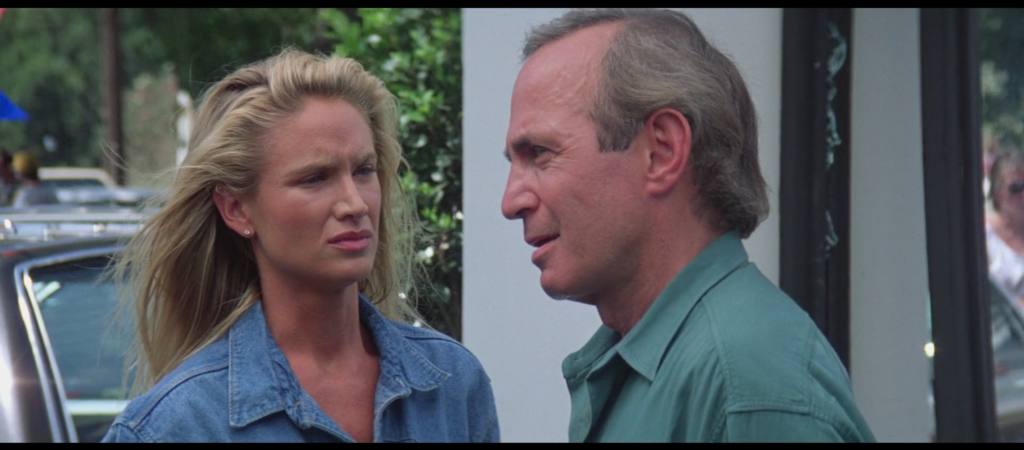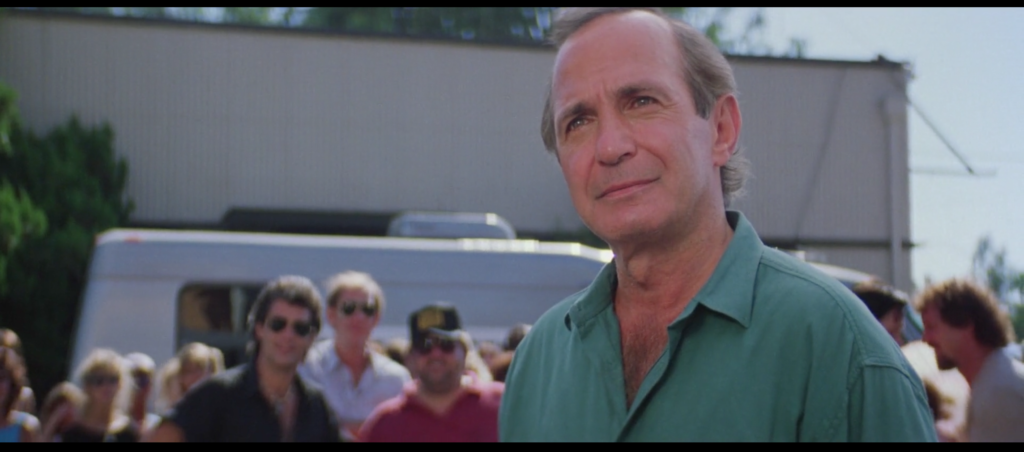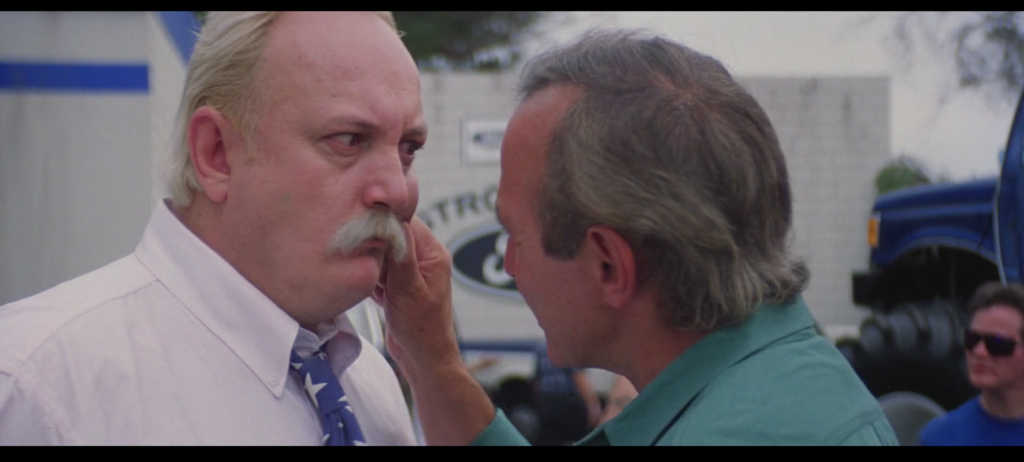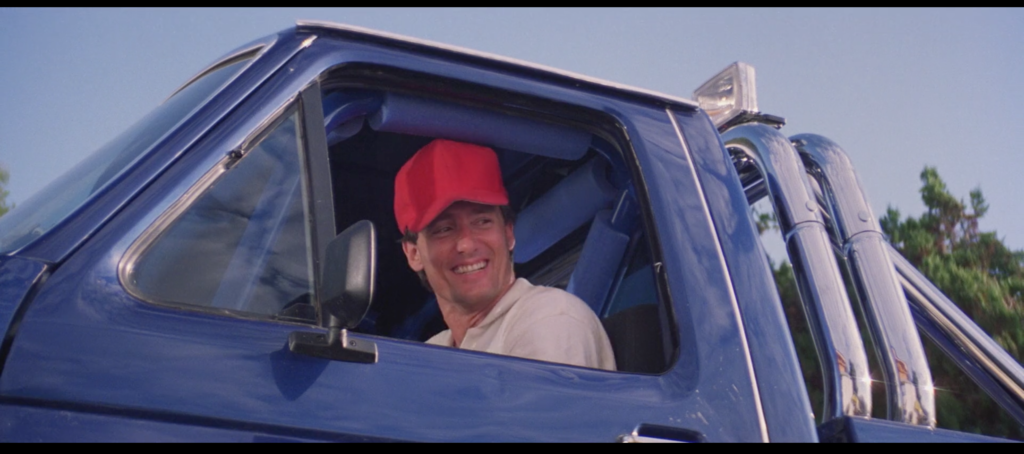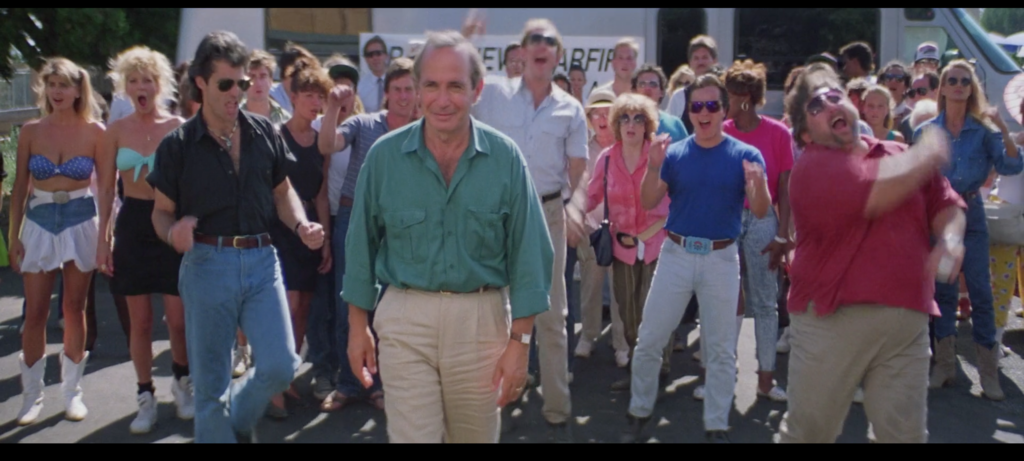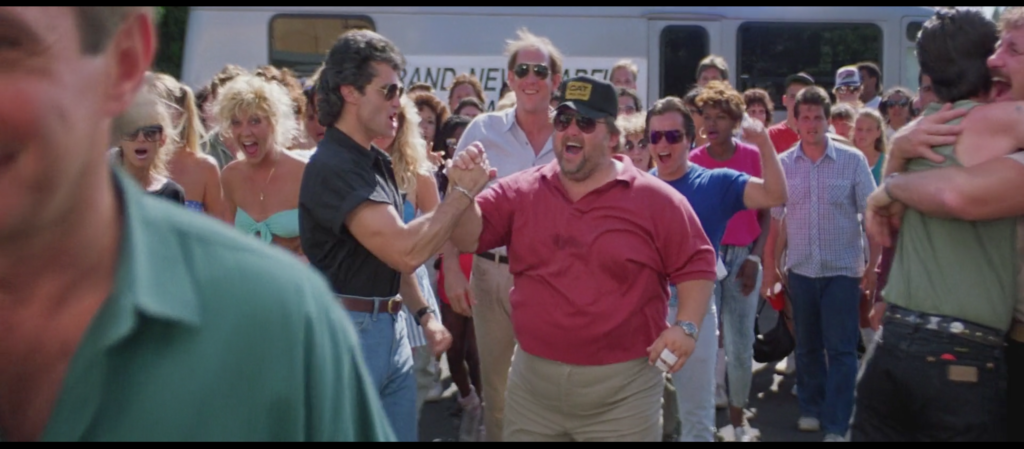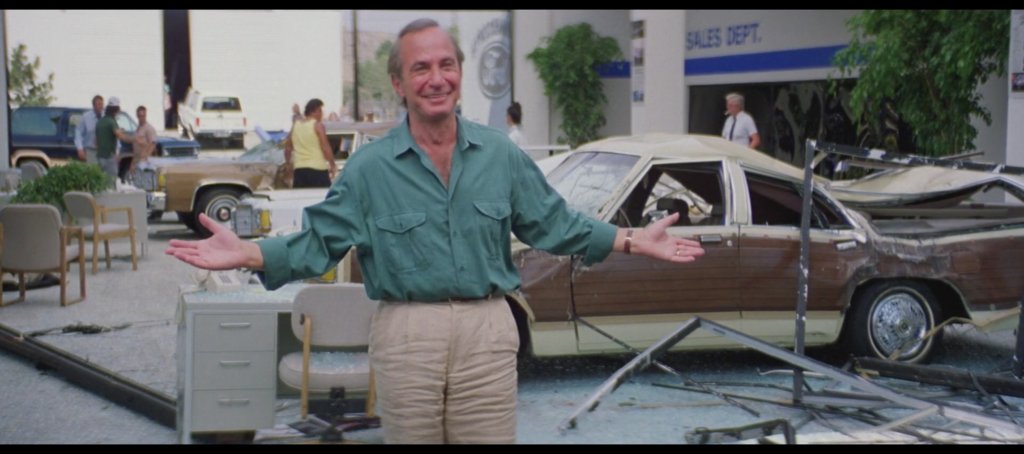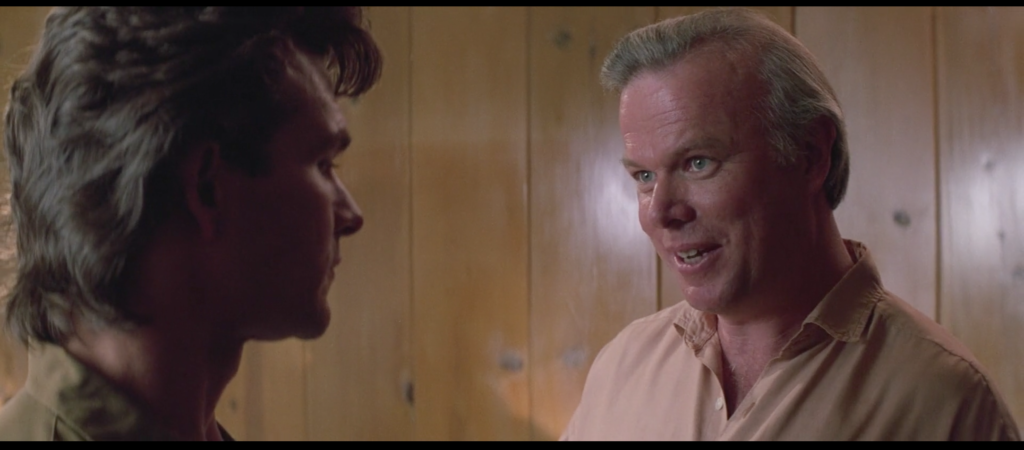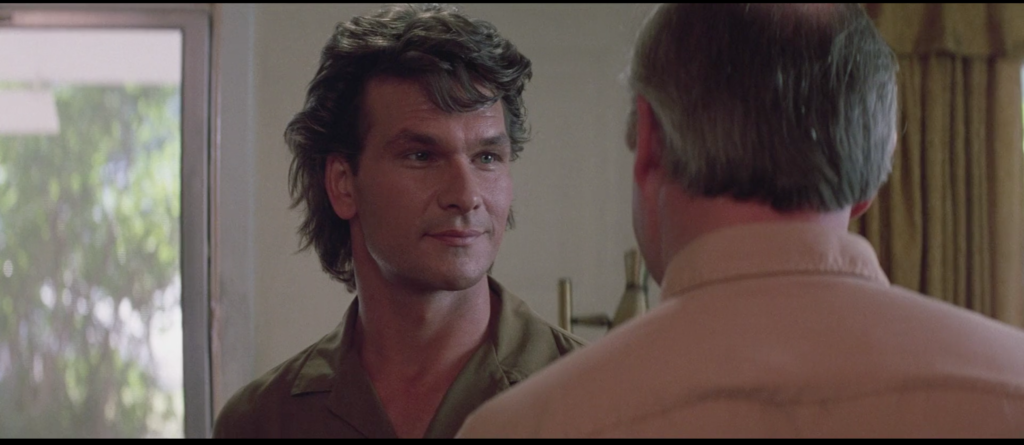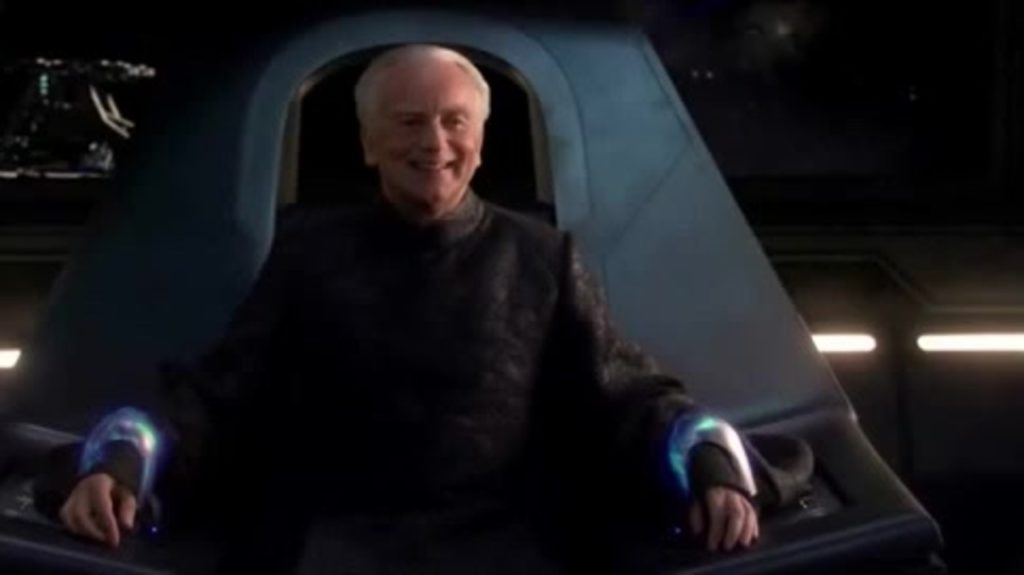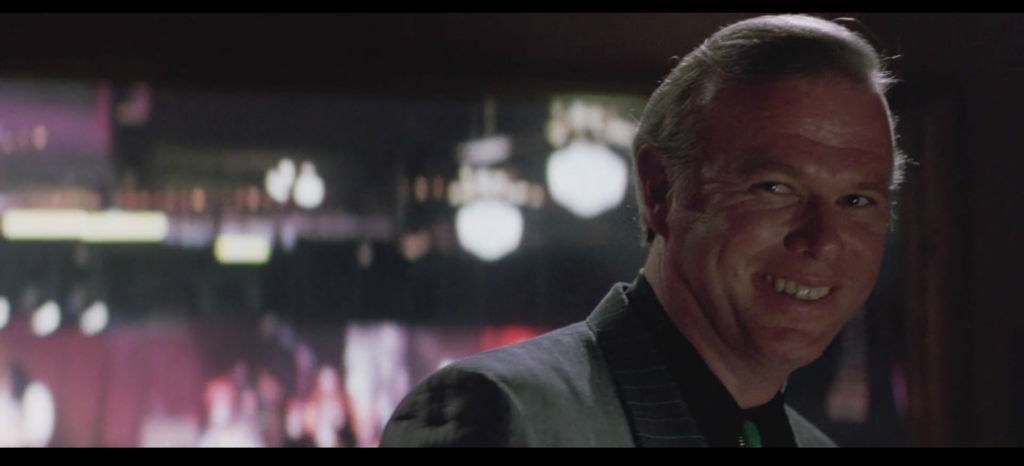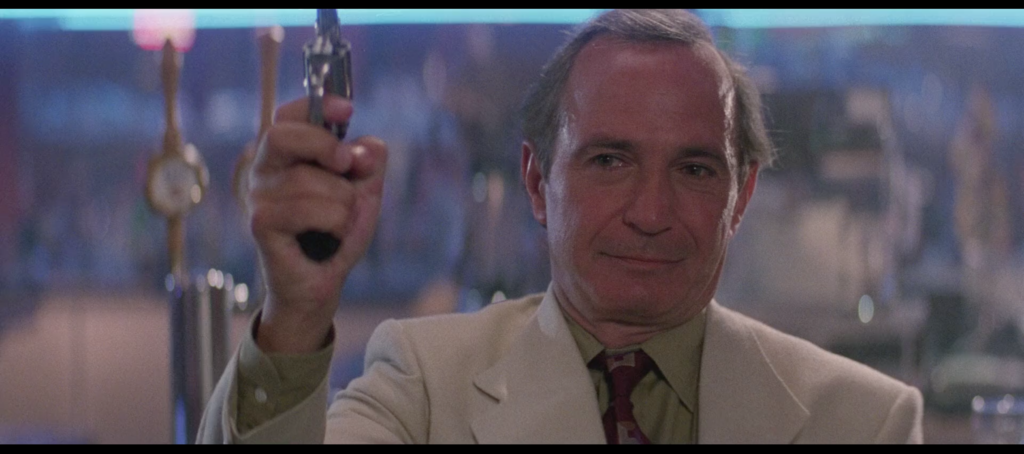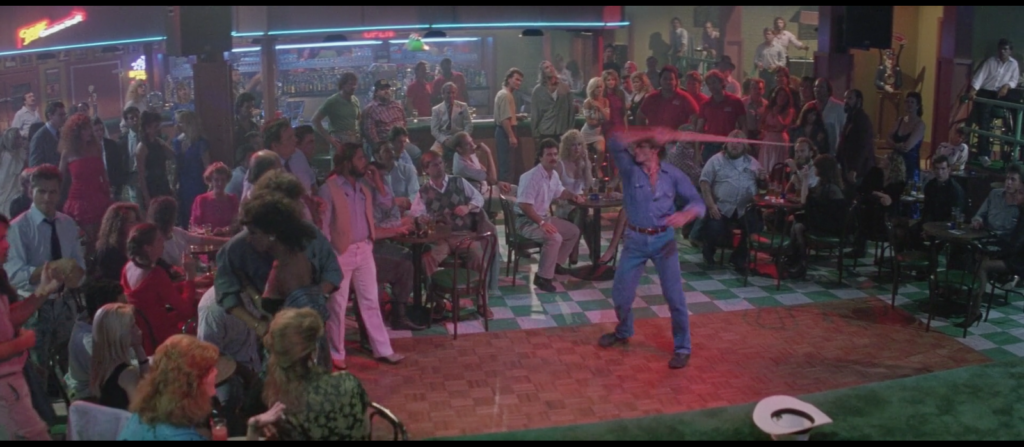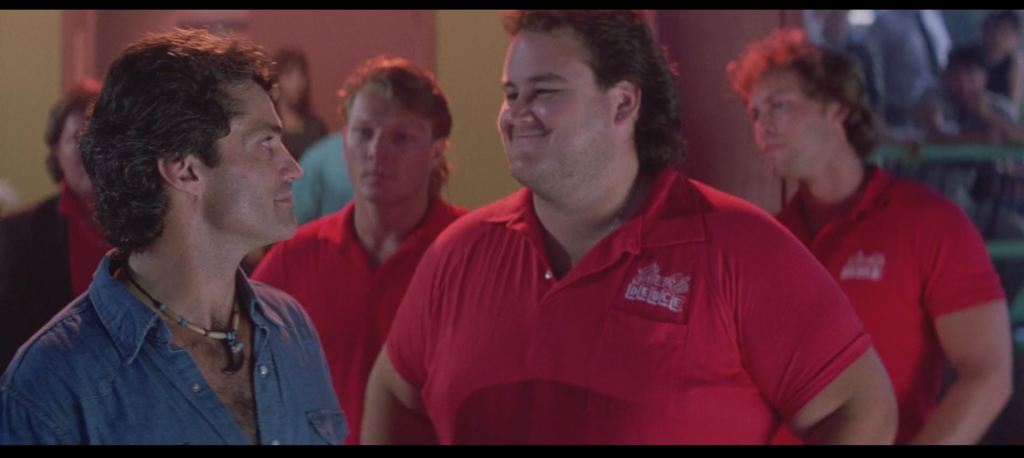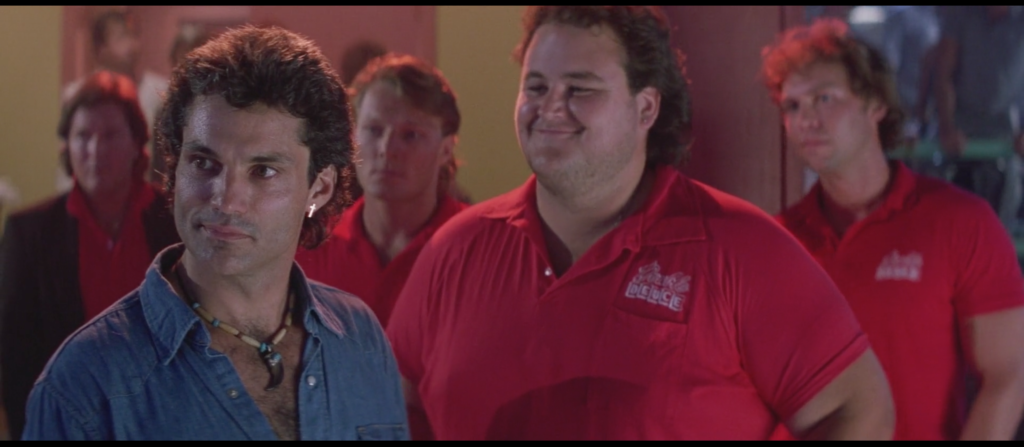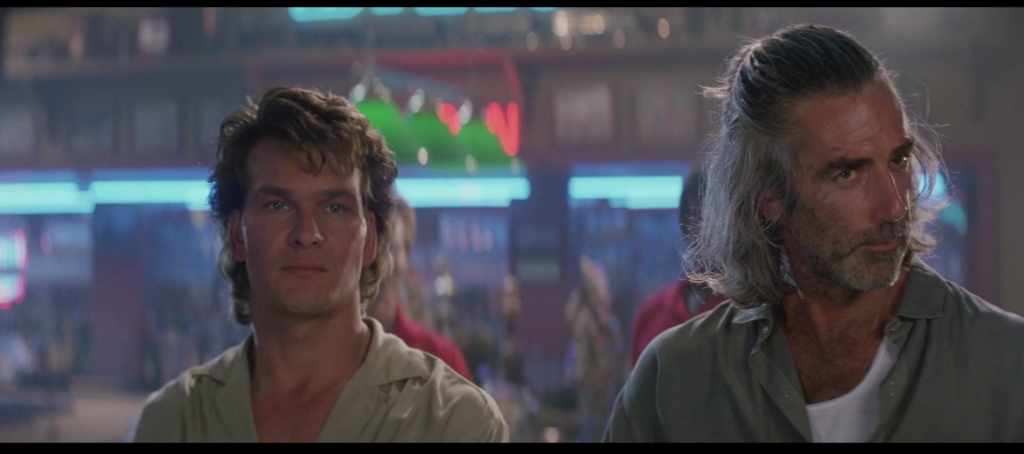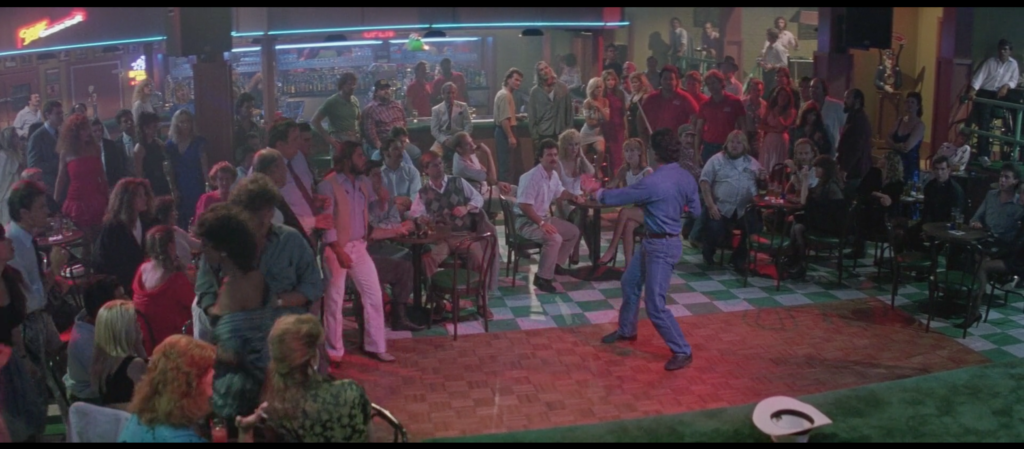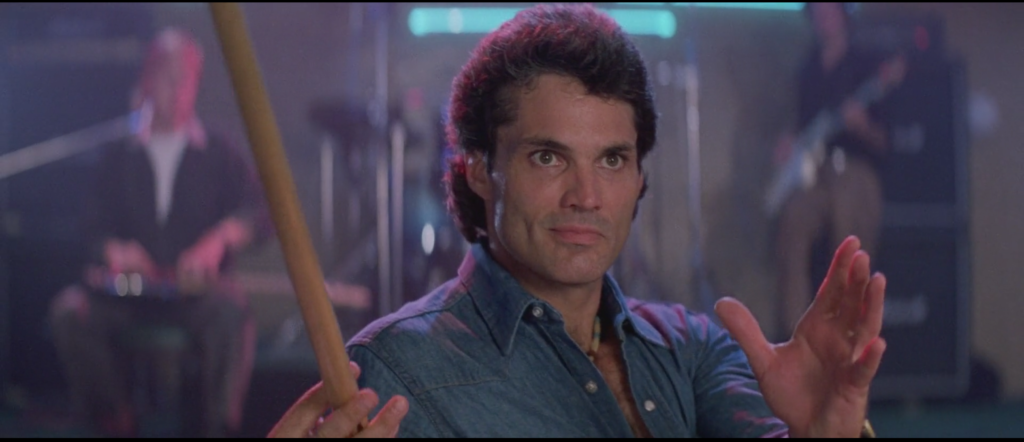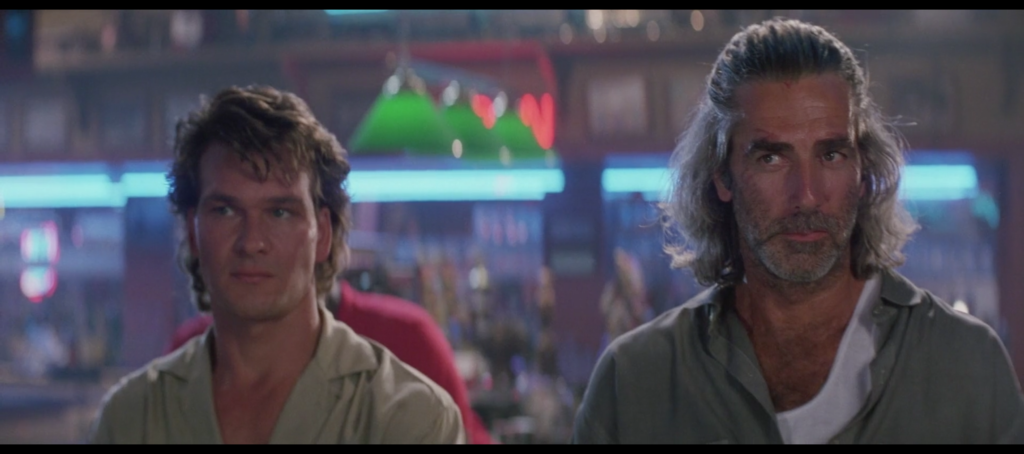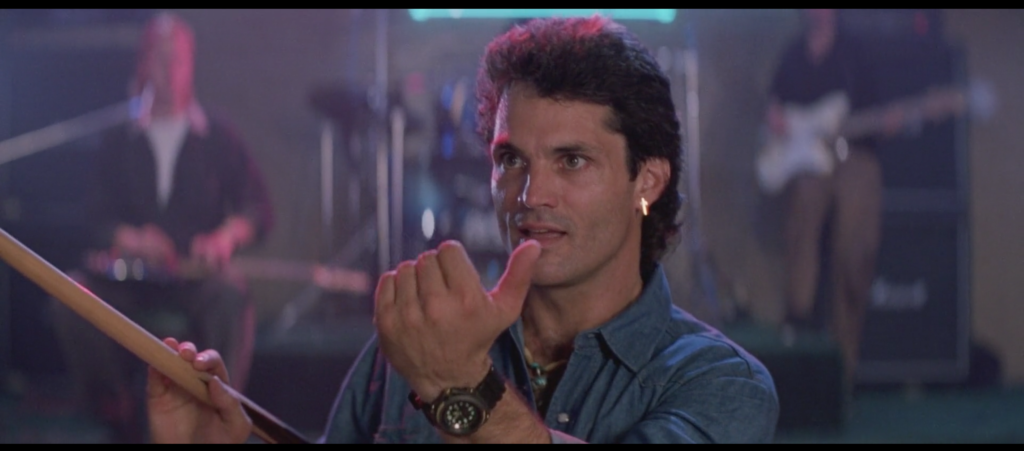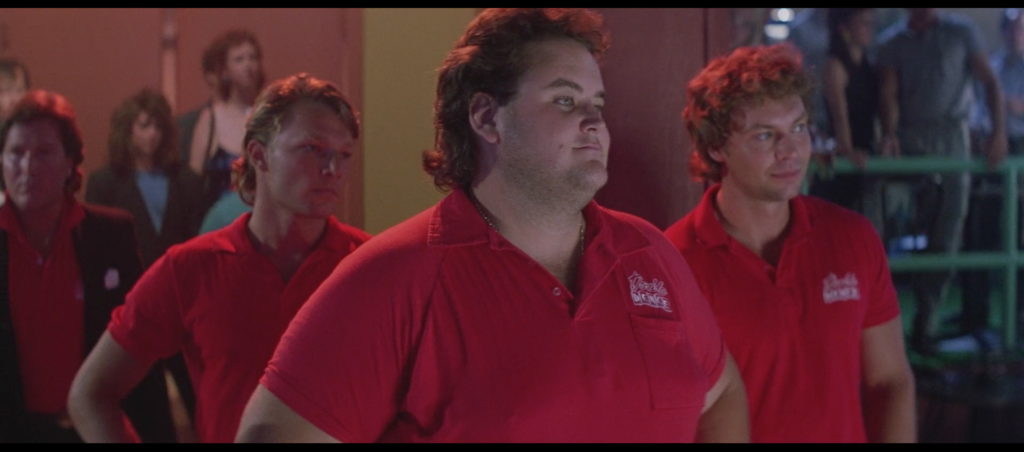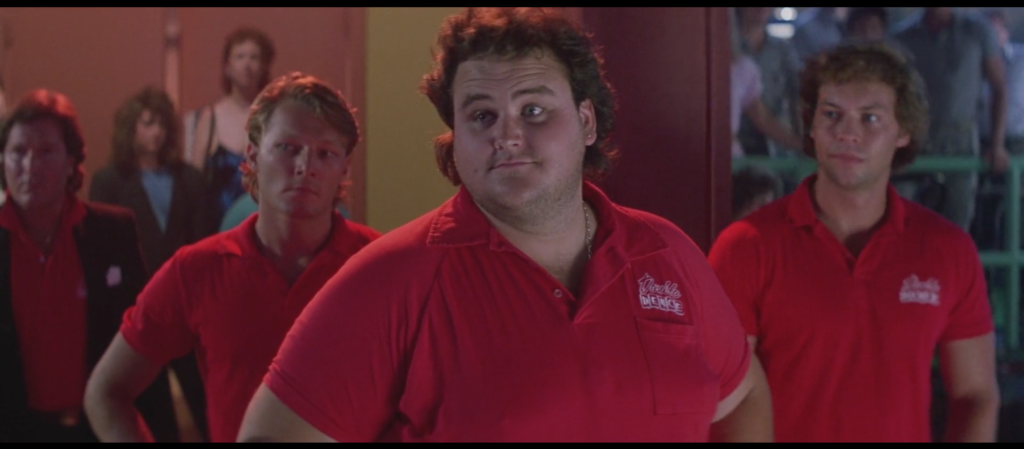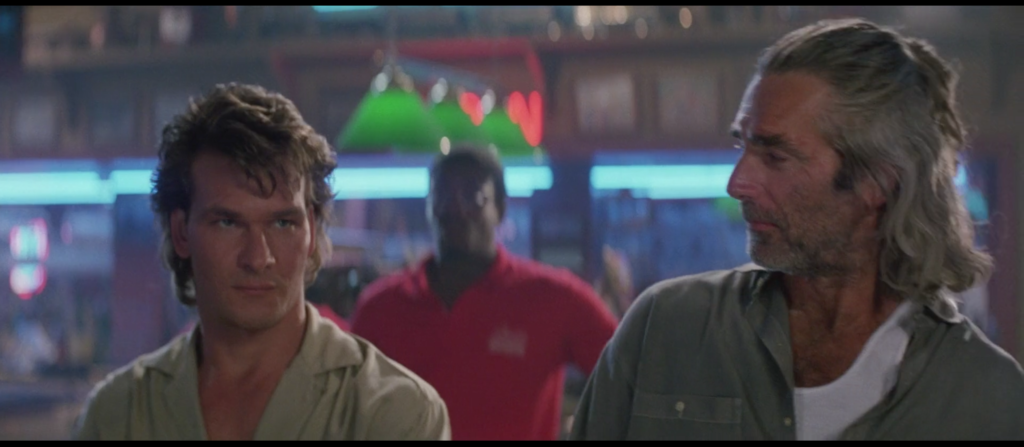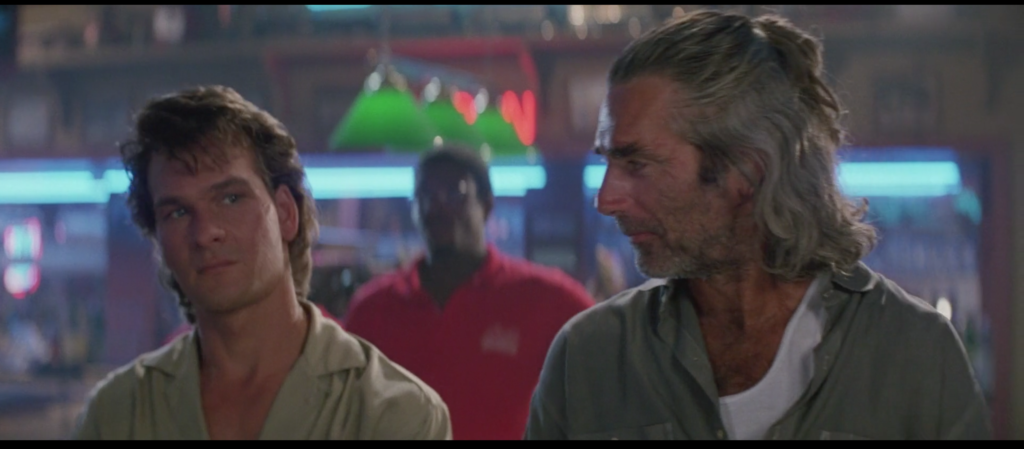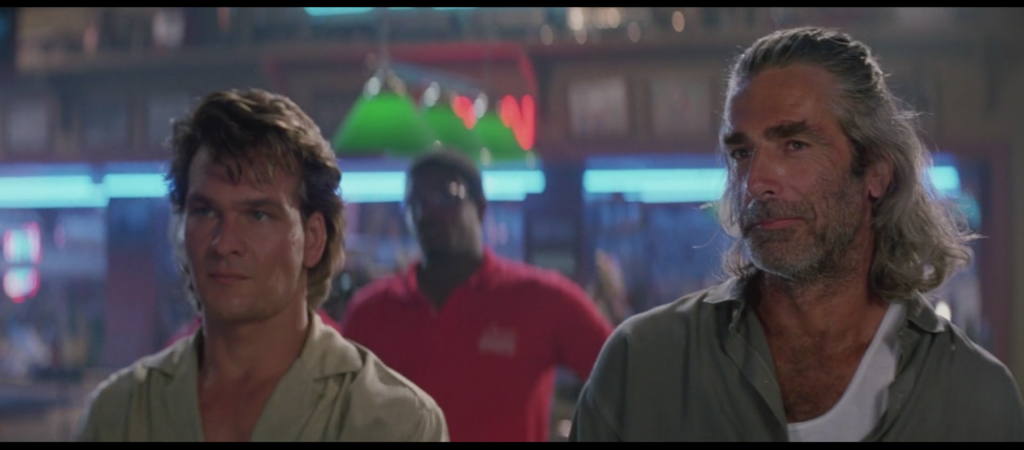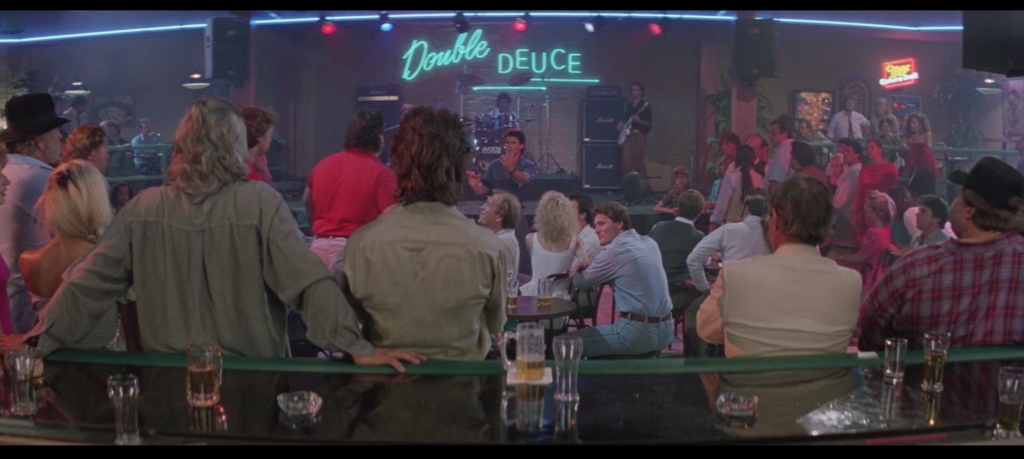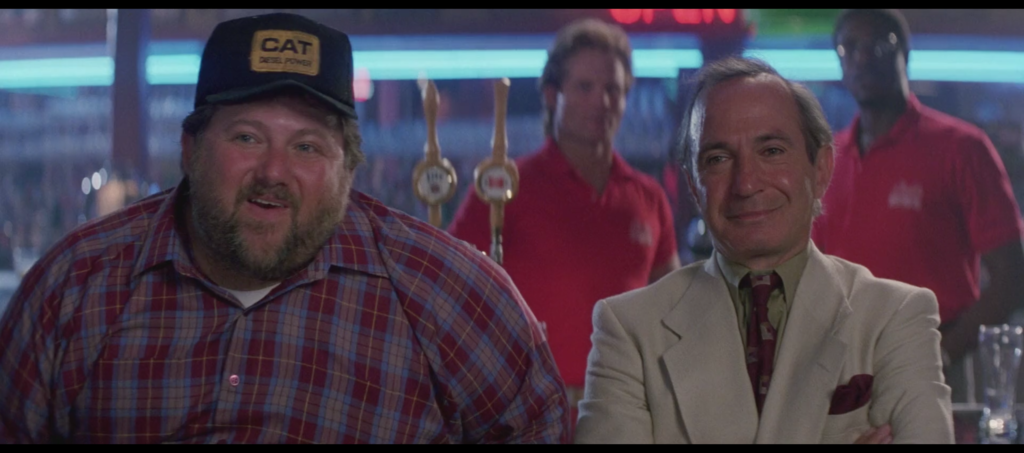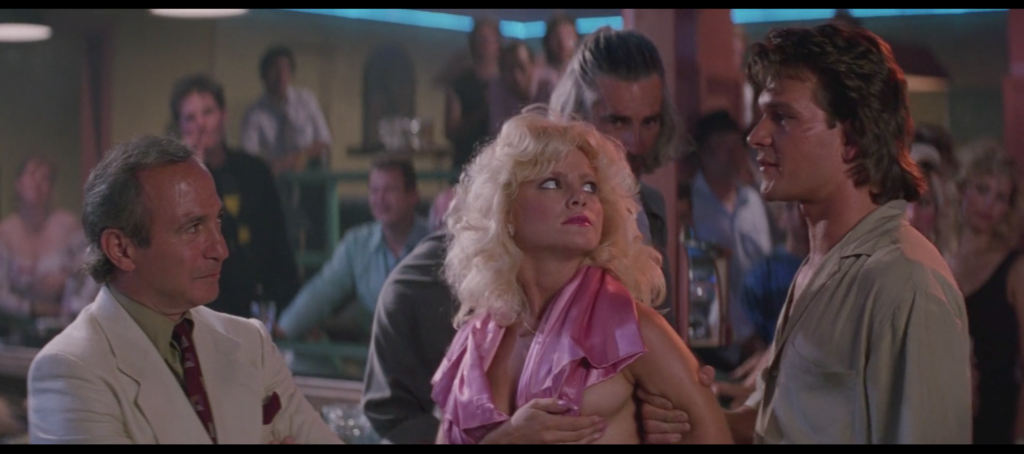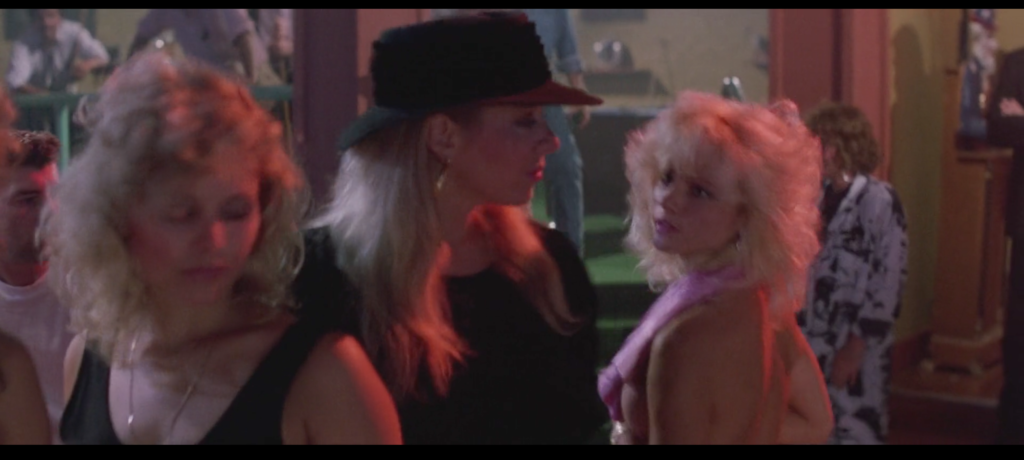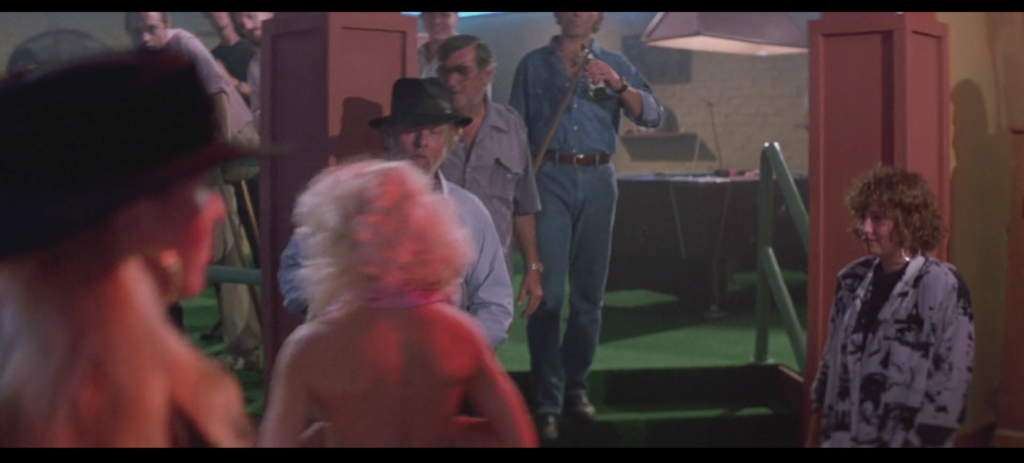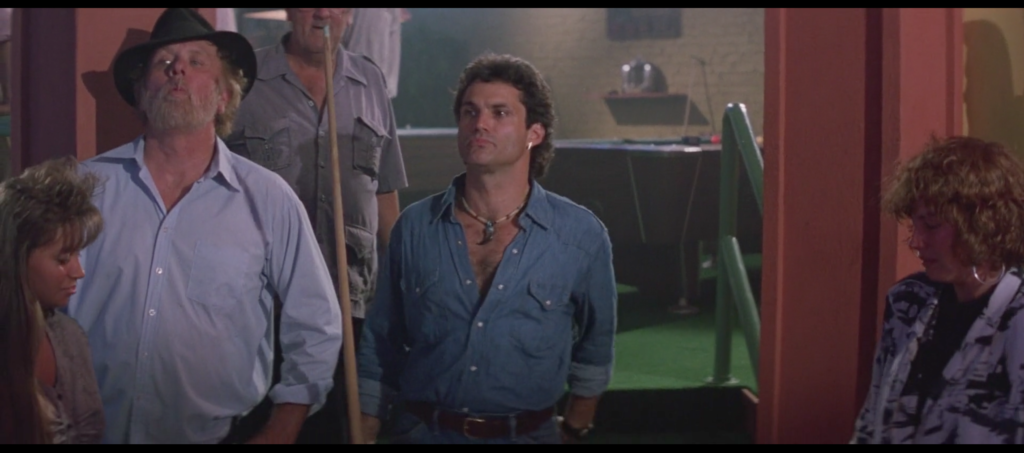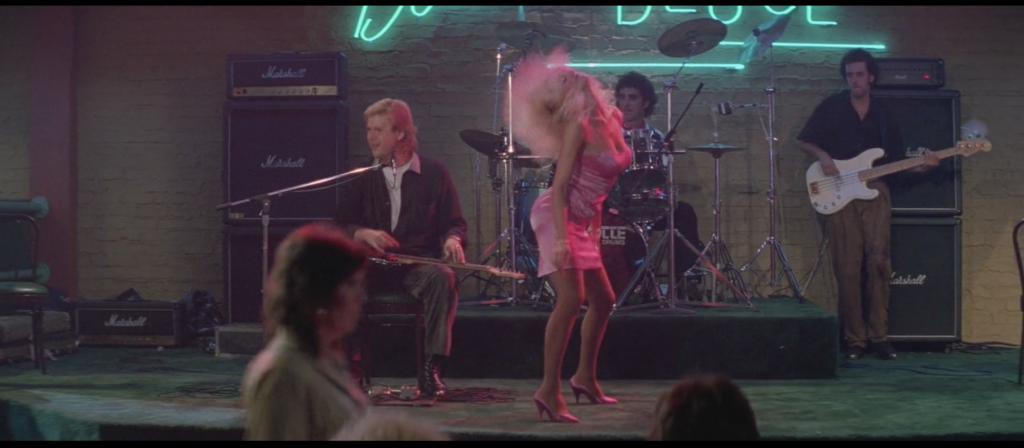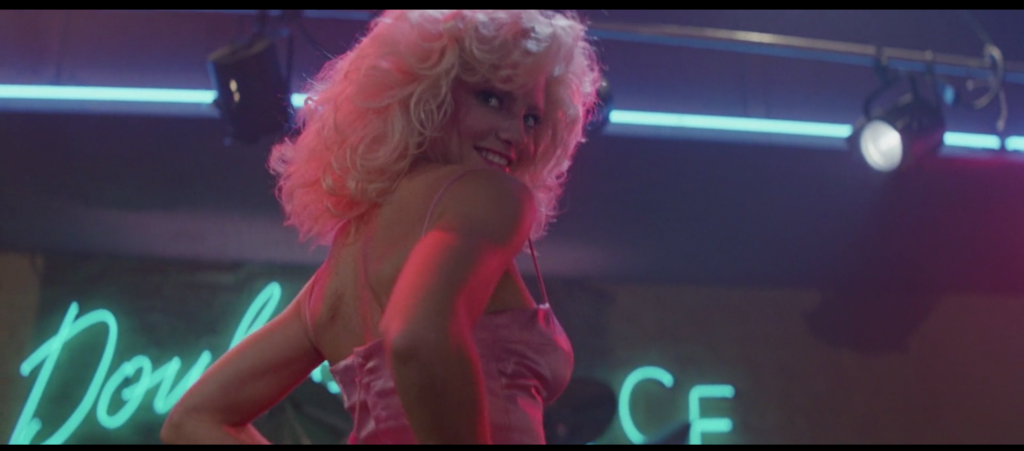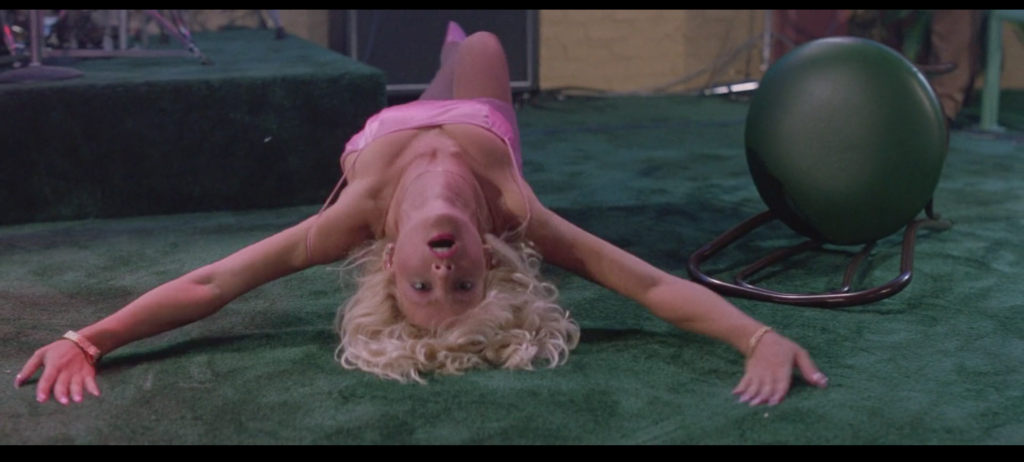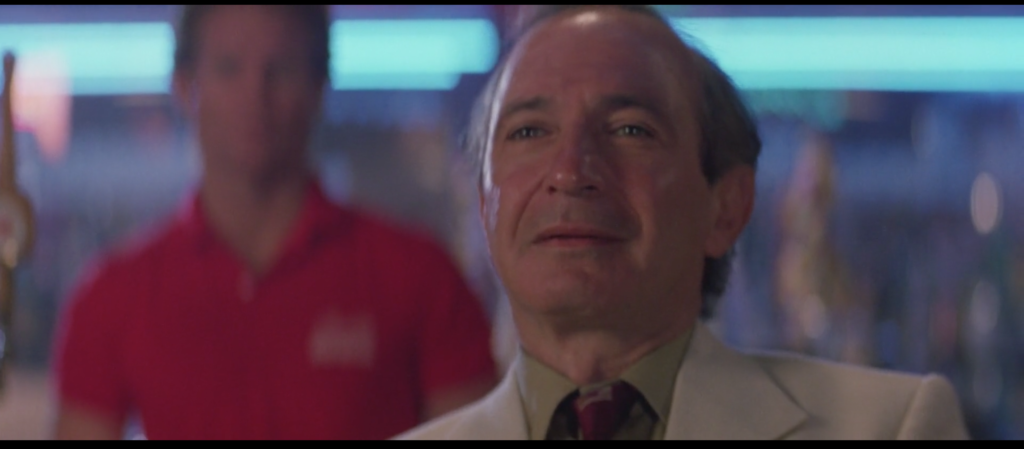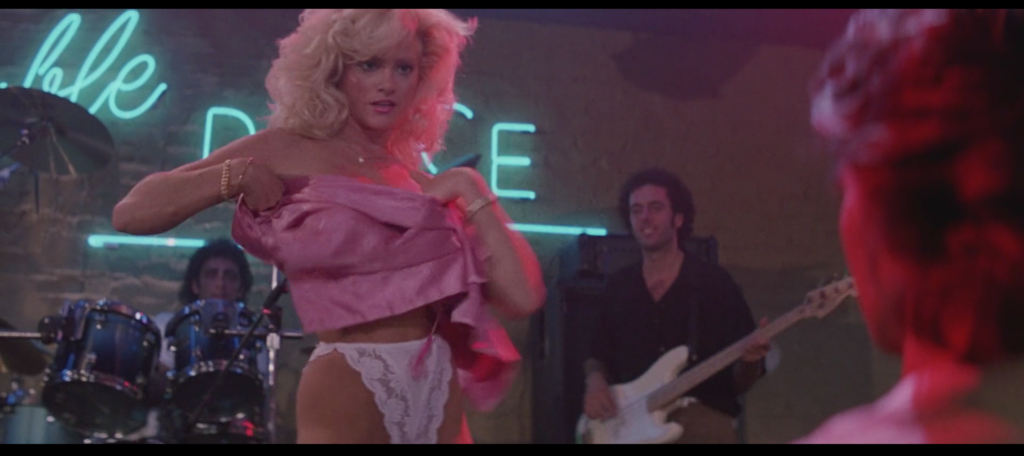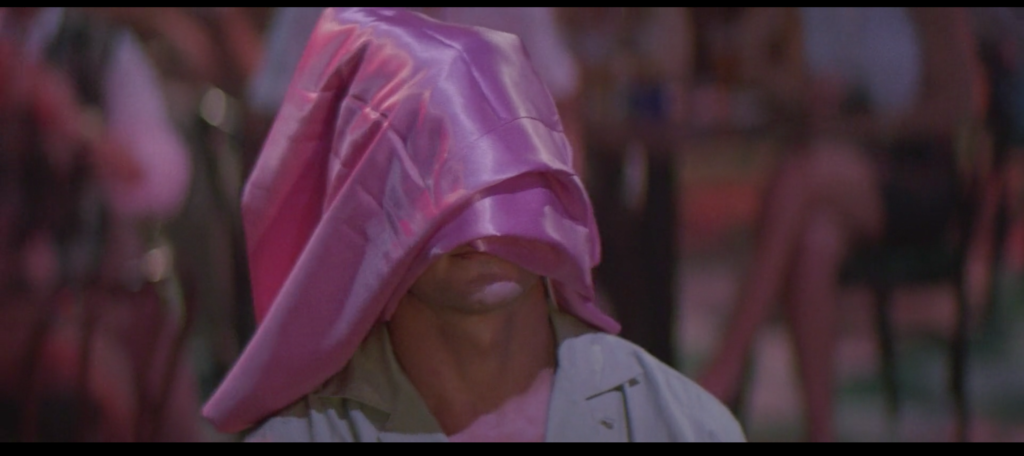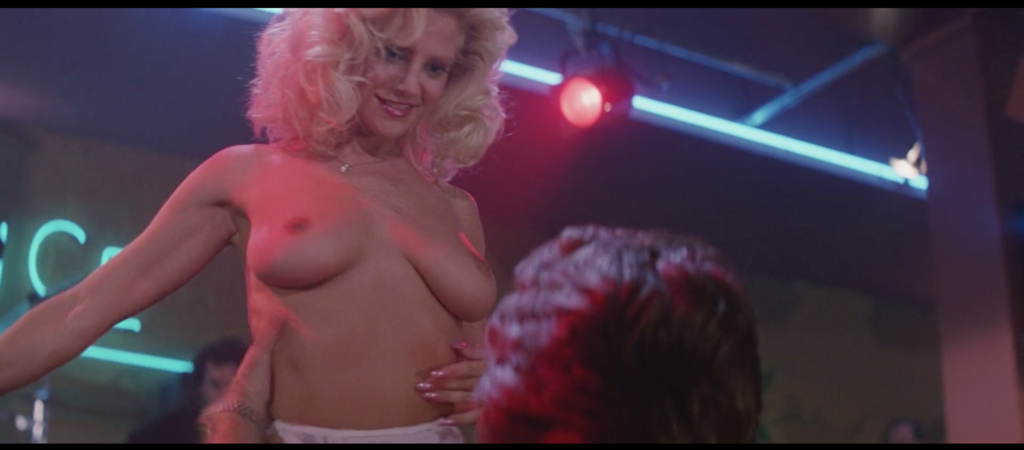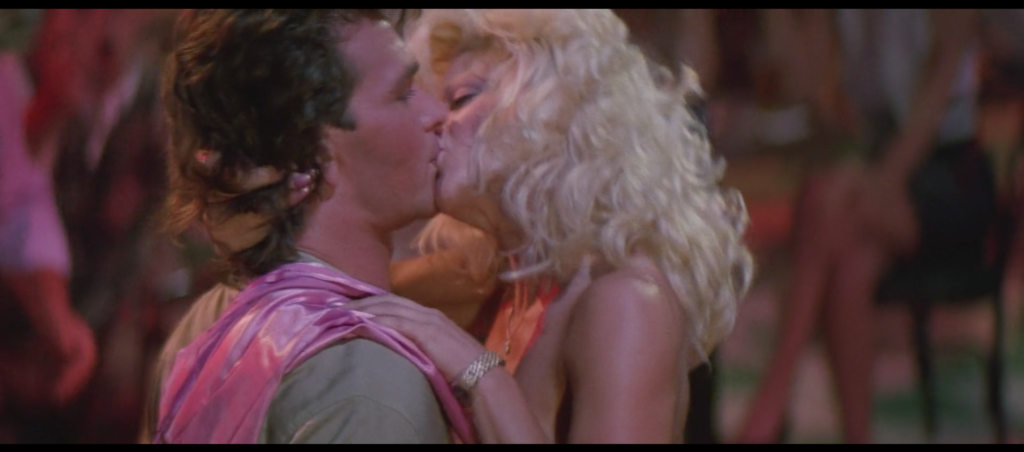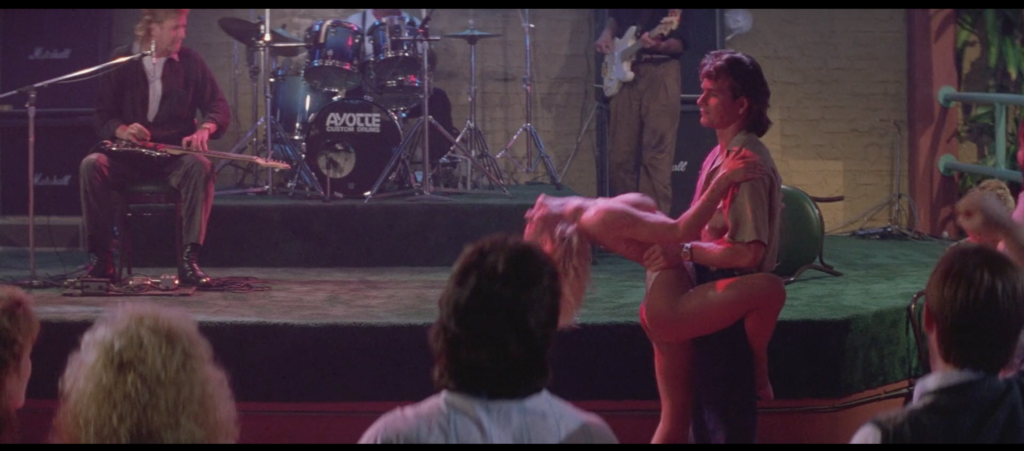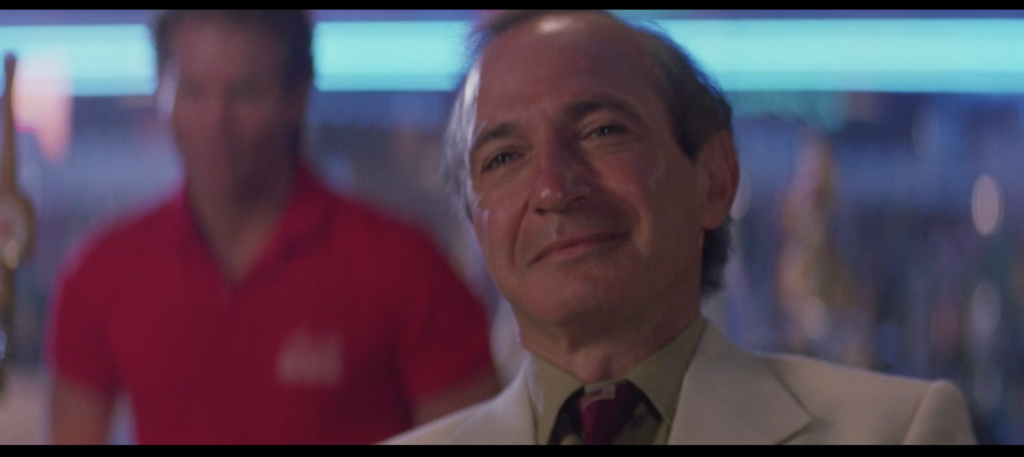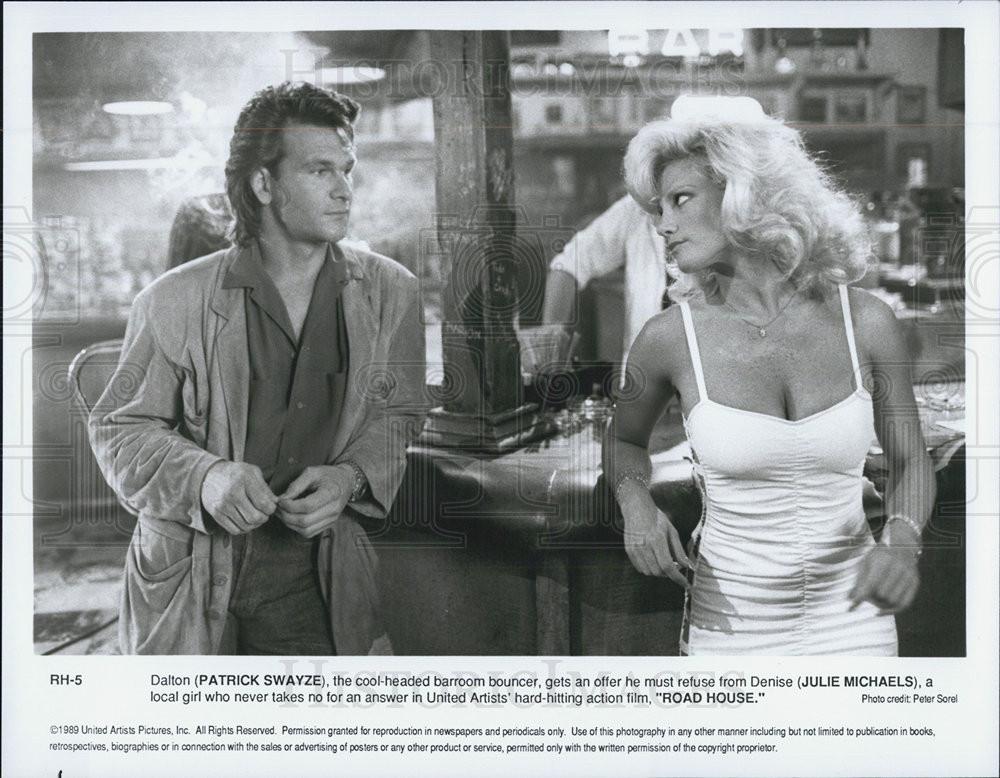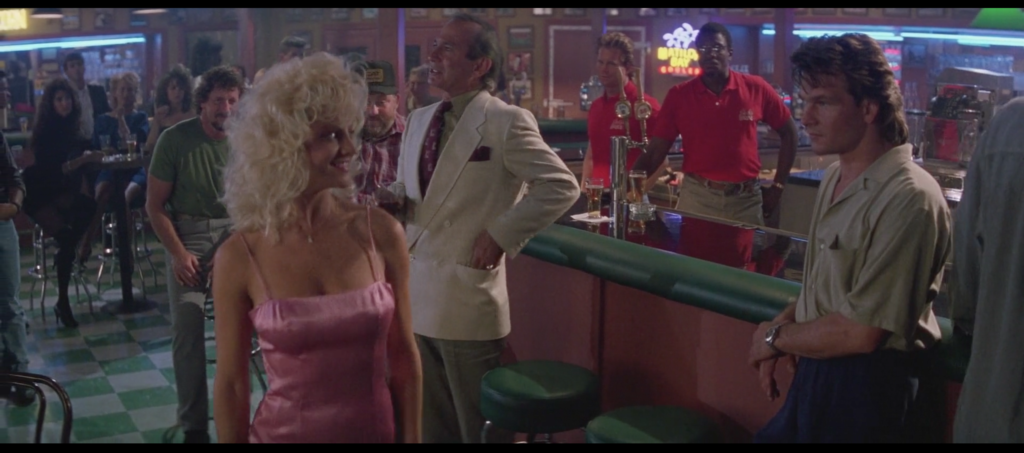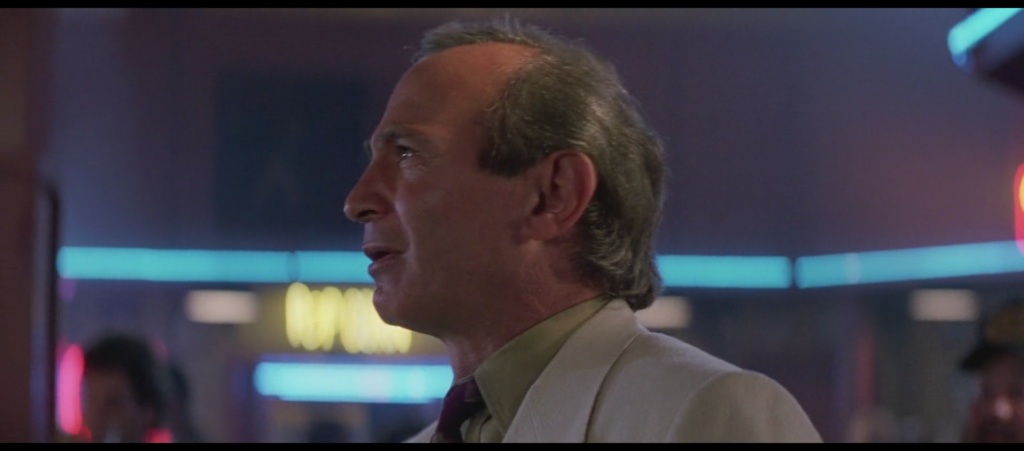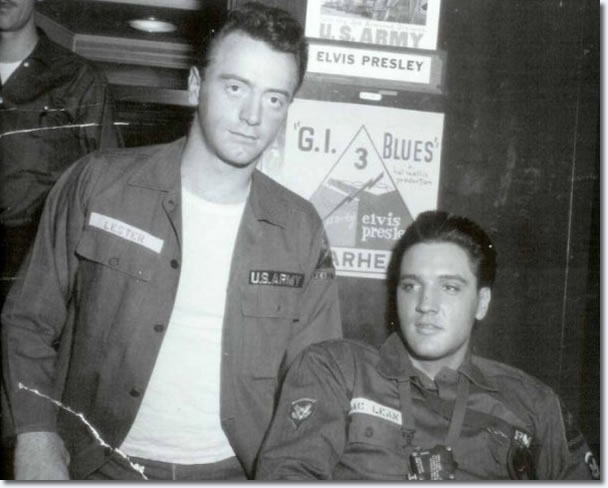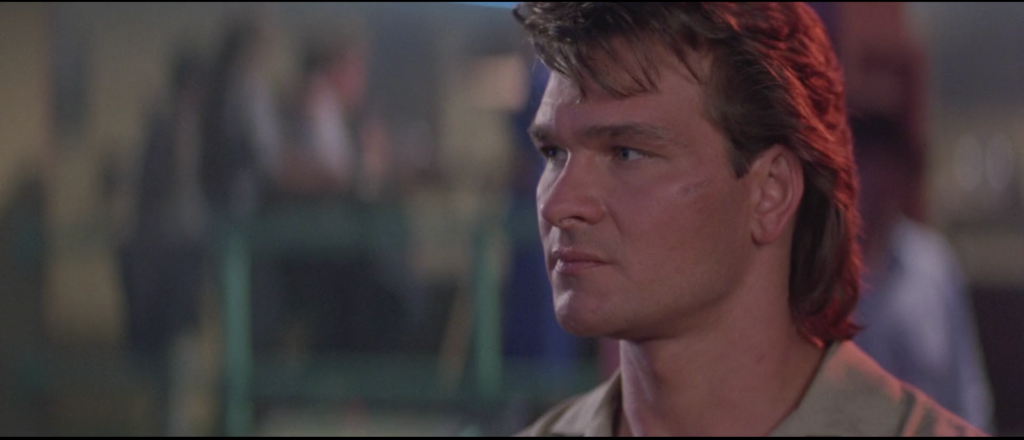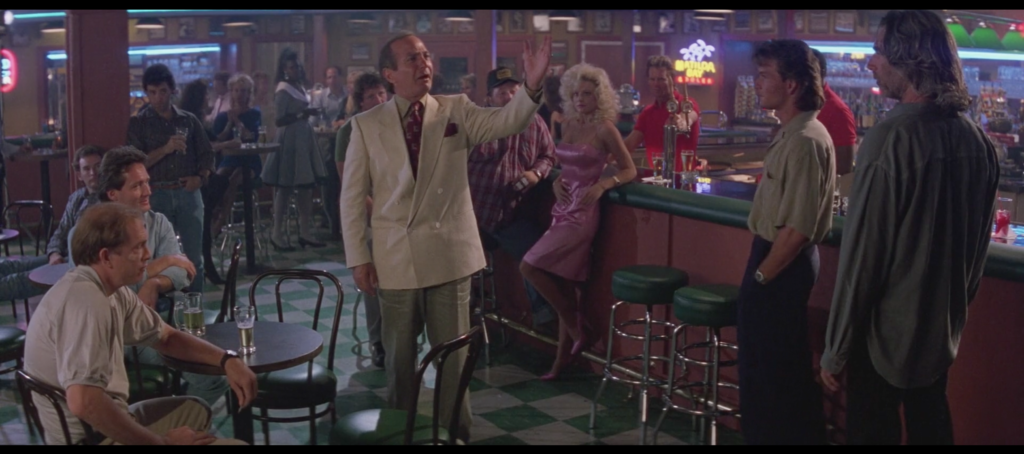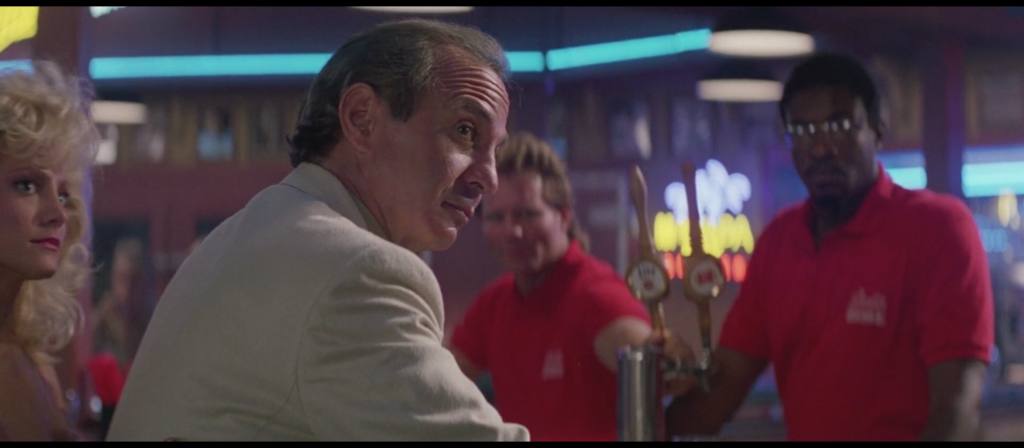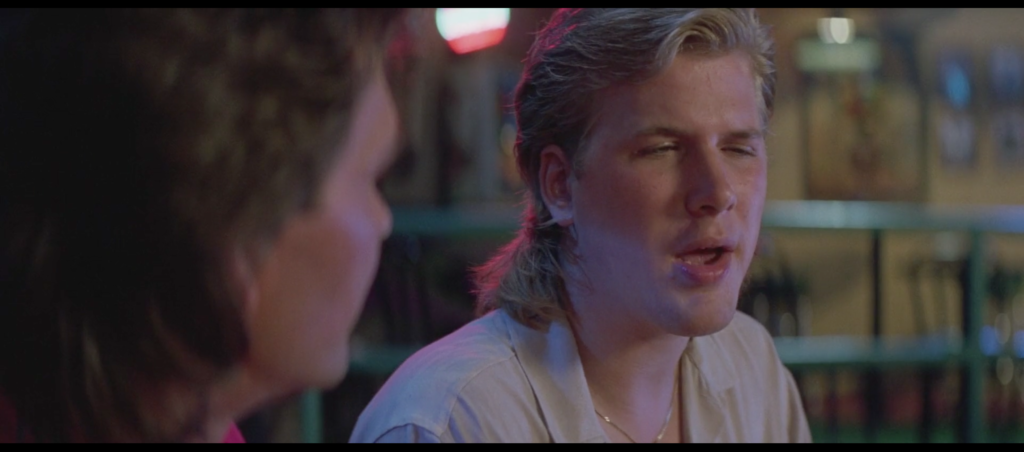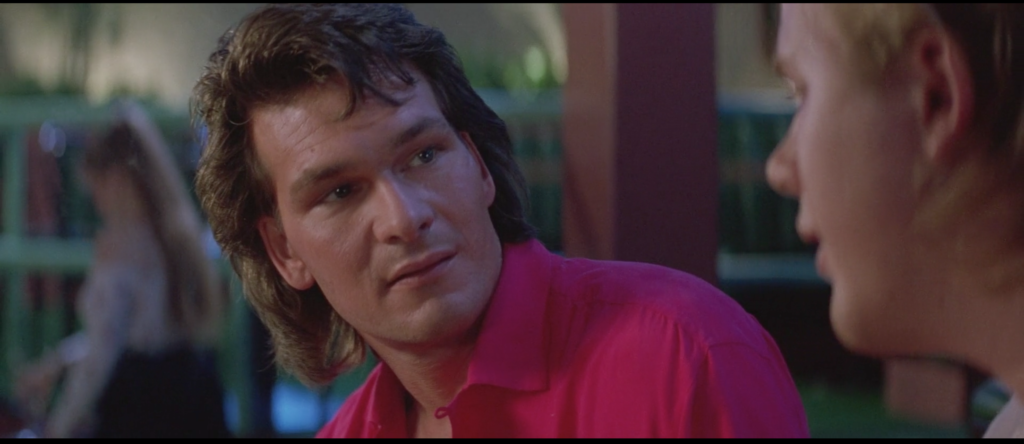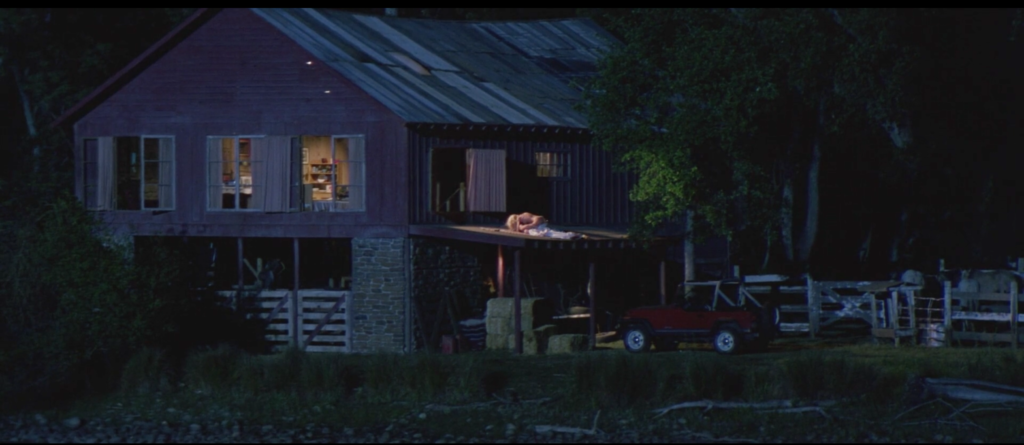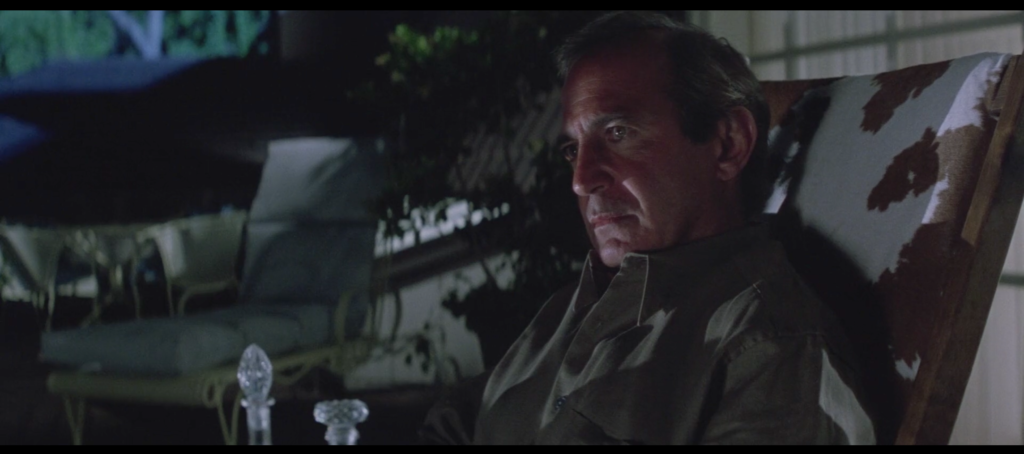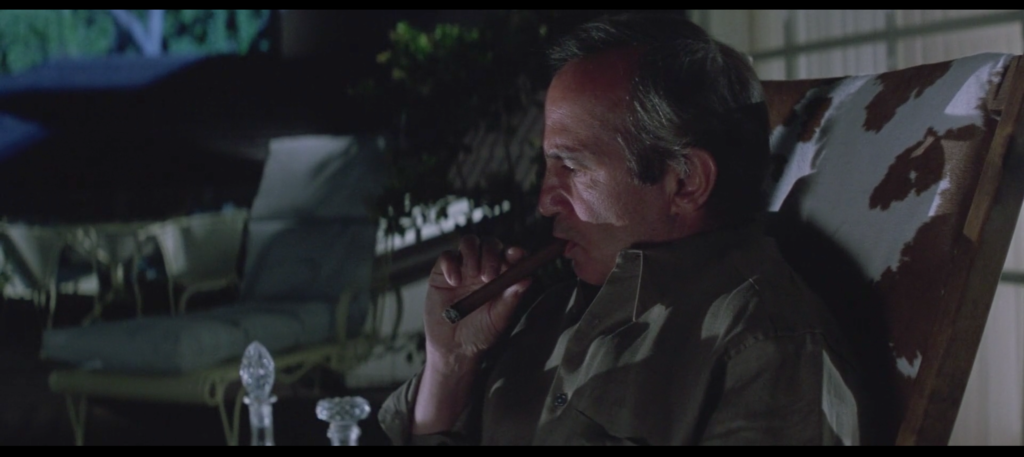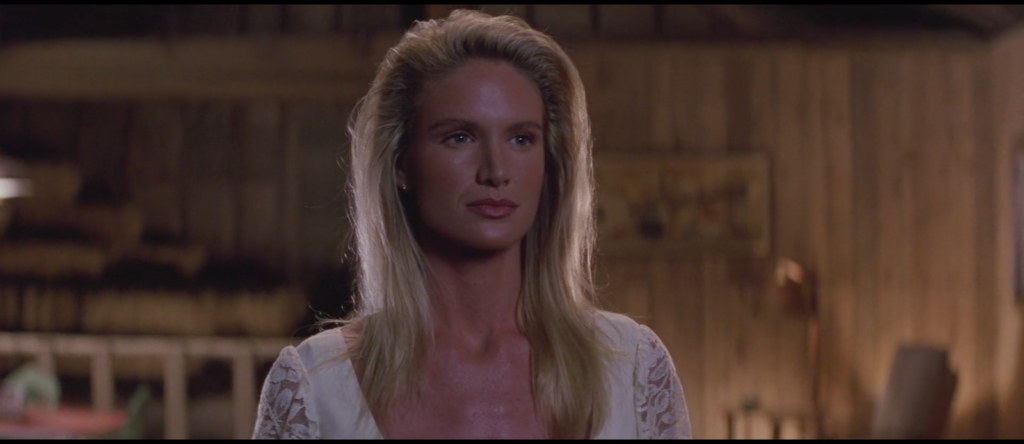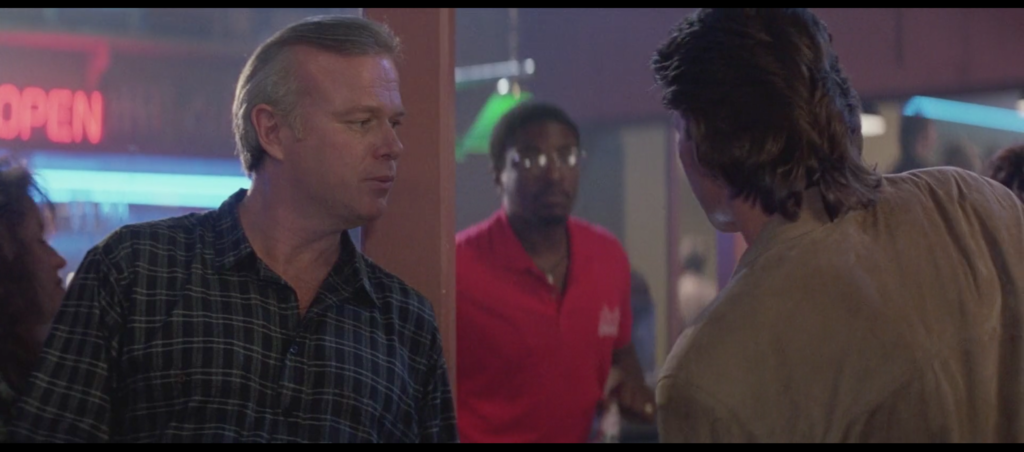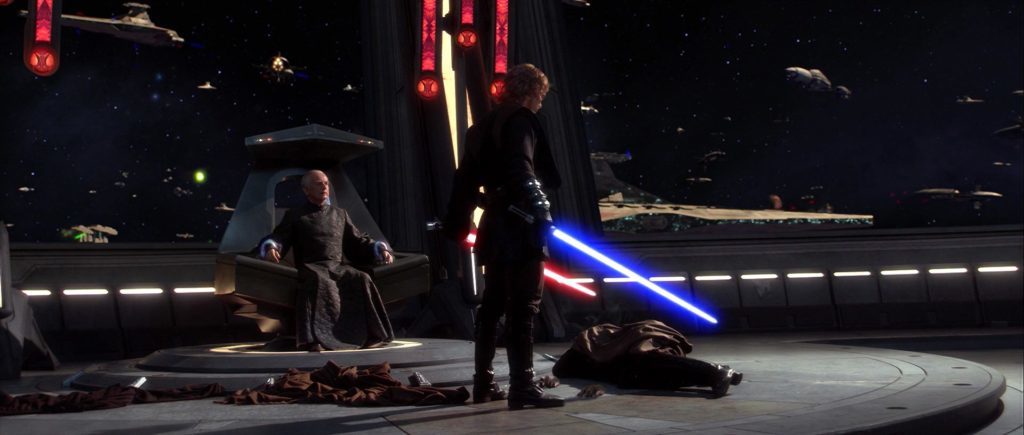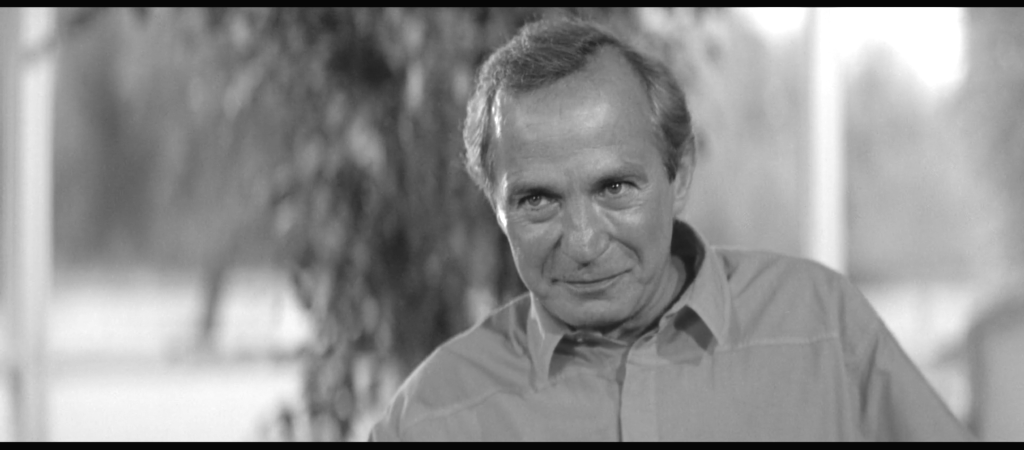Posts Tagged ‘brad wesley’
275. Brad, revisited
October 2, 2019“What the hell is wrong with you, Brad?” Dr. Elizabeth Clay asks. “Have you lost your mind?” Elizabeth is the second person in the film, out of a total of two, to refer to Brad Wesley by his first name; the other was her uncle Red Webster. They were family once, after all. In Red’s case, he likely called Wesley “Brad” in hopes that maintaining a cordial, familial front would spare him his wrath and conceal his true feelings about their business relationship. Much the same could be said for Elizabeth’s use of his first name here—she is, after all, attempting to dissuade him from his current destructive course of action. But there’s a great bit of business that occurs when she approaches to confront him: She takes off her sunglasses, casually but purposefully, the way you do when your sunny day has been unexpectedly interrupted by something serious and you want to see it all clearly as you hash it out. It’s the gesture of one former lover to the next, a removal of a block to renewed intimacy, of whatever kind.
For his part, Brad doesn’t attempt to inveigle his way back into Elizabeth’s heart, or even her bed. His concern for her is almost, though surely Red would dispute the use of the term, avuncular. He doesn’t like seeing her wind up with “a drifter” like Dalton. “It’s a shame,” he says. No “I want you back,” no “If I can’t have you nobody will,” just…it’s a shame. More in sorrow than in anger. That’s Brad for you: perpetually disappointed that no one but his boys will listen to reason. Disappointed, but not dissuaded: “I’m not gonna lose a second’s sleep about it,” he says to Elizabeth after informing her of his plan to murder Dalton should he continue to cause him trouble. What the hell is wrong with Brad? Other people.
273. My town
September 30, 2019“This is my town,” Brad Wesley tells the Four Old Men. “Don’t you forget it.” And it’s true, as far as the numbers go. Brad Wesley got the mall, the 7-Eleven, the Fotomat—Christ, JC Penney is coming there because of him, you ask anybody, they’ll tell you. What do his opponents have? Red Webster’s Auto Parts? Not anymore. Strodenmire Ford? Not anymore. The Double Deuce? Only because Wesley granted it a reprieve and called off the fight between Wade and Jimmy. Emmett’s horse ranch? It won’t surprise you to learn that it’s next on his hitlist. Granted, there’s Big “T” Auto Sales, the nameless old man’s auto parts store, and an entire network of greasy spoons and dive bars, plus the boat store we can see from the Double Deuce’s parking lot, but as far as we know the Four are the only people who’ve put up any fight against Wesley’s protection racket. It’s a numbers game, and the odds are in Mr. Wesley’s favor. As of this moment, Jasper has been remade in his dark image. For Dalton, this means events will accelerate and escalate at an alarming pace as the transformation struggles to complete.
271. Abuser
September 28, 2019“You lost your faith, Strodenmire, that’s what it is,” Brad Wesley tells the walrus-mustachioed man who just wanted Jasper to enjoy Wagon Days, pinching his cheek like a child’s in the process. “It’s made you an abuser!” he concludes, wagging a finger in the man’s face. Thus is the gaslighting of Strodenmire by a man who infantilizes him, touches him without permission, browbeats him in front of his friends, and then destroys his property in an act of classic victim-blaming. Strodenmire’s eyes are remarkable in this scene, huge limpid saucers of anger and terror and, yes, confusion. Have I lost faith? Am I an abuser? In the time it takes Strodenmire to process the words of the man who is victimizing him, Gary Ketcham runs over his car dealership with a monster truck. “I never thought you’d turn on me too,” Wesley says when it’s all over. The message is clear: Look what you made me do.
268. Happiness Is a Squashed Ford
September 25, 2019Gary grins from ear to ear. Jimmy does a double fist-pump. O’Connor raises an arm aloft in triumph. Tinker yee-haws his hat off his head. Pat McGurn and Morgan? They literally embrace. (Jimmy and Tinker merely clasp hands.) The Goon in Blue (about whom more later) is just happy to be there. And Brad Wesley acts like a game show host. Truly, the destruction of Strodenmire Ford by the coward Gary Ketcham is the high-water mark of villainous delight for the Brad Wesley organization. For once in their miserable lives they managed to get one over on their enemies in a way that did not require any of them to get their asses kicked. They didn’t even need to throw a punch, much less take one. They just had to get behind the wheel of a monster truck—one of them did, anyway—and drive on through to the other side. The rest take a joy in this of the sort you see in bars when the home team wins the Super Bowl. They are thrilled, inordinately thrilled, “the director overdid it” thrilled, to have watched a monster truck run over a car dealership. Did I point out that Morgan and Pat, the two orneriest cusses in the whole gang, hug each other, like one just announced his wife is expecting? This is the rough beast they gave birth to instead, haulin’ ass towards Bethlehem to put a little something down on a new car.
265. Fear itself
September 22, 2019Frank Tilghman is having scotch on the rocks at the “village worthies meet at Red Webster’s house as he packs up to move following the destruction of his place of business and the subsequent barfight instigated by the arsonist” function, as a totally normal innocent normal man could be expected to do. But he has more to offer than the jolly sound of ice tinkling in his glass. “You scared him last night,” he says to Dalton regarding Brad Wesley, who we’ve just learned from Red Webster has the police department in his pocket, hence the lack of official inquiries when people are beaten half to death in front of hundreds of other people. “Brad Wesley, he’s not afraid of anything, right?” he asks rhetorically. “Well, last night, that son of a bitch was afraid.”
“No he wasn’t,” Dalton retorts, smiling. Normal conversation with normal reactions all around.
Dalton is right, of course. Brad Wesley oozed confidence out of every pore in the Double Deuce the night before. He had his girlfriend or kept woman or whatever poor Denise is strip to prove his prowess. He then ordered his boy Jimmy to fight the bouncers and Wade Garrett for the same reason. Finally, he fired a gun to call the fight off, showing that the action starts and stops on his say-so. He really could not have been more empowered, and more sure of his empowerment, even before we get to the whole “getting away with arson” thing. Christ (as Wesley would say), he went to the Double Deuce for the express purpose of rubbing his role in the arson in everyone’s face!
So once again we must wonder, what’s Tilghman’s angle here? Why is he having a drink? Why is he smiling? Why is he touting a nonexistent weakness in Brad Wesley’s armor to the man he wants to attack that nonexistent weakness? Why would he instigate further hostilities given the tremendous cost incurred by everyone involved other than himself?
260. “This isn’t working out, Dalton”
September 17, 2019Brad Wesley has had enough, though it’s unclear of what. Denise’s dance? He ordered it. The barfight? He started it. Jimmy’s faceoff with an outmatched Wade Garrett and an untested Dalton? He instigated it. Everything happening in the Double Deuce right now—even the bit where the whole place ran out to watch Red Webster’s store explode—is Brad Wesley’s design. So why fire a gun in the air and call everything off?
When all you have is a hammer, every problem looks like a nail. Brad Wesley has two things: a colossal ego, and a gun. Not even he can shoot a man or two men to death in front of a bar full of witnesses, but still, the possession of the gun necessitates its use. That’s when the colossal ego comes in. Brad Wesley made the nights events happen, and he must show that he can unmake them as well.
What’s more, he must exert ownership over all of the involved parties. Think of how he told Denise to dance: “Of course you can dance, honey,” as if she’d asked his permission. It was noblesse oblige even to phrase it that way—he was commanding her, not responding to an audible request after all—but it still put him in the driver’s seat. So too did rolling with Dalton’s pet metaphor and summoning forth Jimmy, his top dog.
And so does his statement, after firing the gun to stop everyone in their tracks and saying “that’s enough”: “This isn’t working out, Dalton.” As if Dalton had asked. As if he and Dalton had entered into some agreement his end of which Dalton was no longer holding up. As if all events in Jasper, in every home and every place of business, must be run past Brad Wesley.
In that sense, this really isn’t working out, as Brad Wesley will learn to his sorrow, but not before sorrow is meted out in kind.
256. The Childlike Jimmy
September 13, 2019When Jimmy finally enters the fray, after three quarters of the film have elapsed, he does so wielding a pool cue. In this he is living the dream of every child who ever grabbed a hockey stick or whiffle ball bat or cardboard wrapping-paper tube and fancied themself a swordfighter, a Jedi, a Robin Hood, a Zorro, a Knight of the Round Table. He’s playing a game with violence.
Of all Brad Wesley’s “boys,” to use his preferred term, Jimmy is his clear favorite. It has been the position of this series that this stands to reason, because Jimmy is Brad Wesley’s bastard son. Once estranged, they are now thick as thieves. The older man, I suspect, yearns less to make up for lost time than to, in his words, “gather unto me what is mine.” A Brad Wesley who discovers his by-blow is a Brad Wesley who instantly dedicates himself to Brad Wesleyifing that product of his loins—who will see himself in all his offspring’s most valued qualities.
But by the same token, Jimmy would look to be the son Brad Wesley never knew he had. That means obedience. That means mimicry—the same sly smile, the same eyes sparkling with malignant good cheer. And that means, on some level, behaving as a child would behave. Yes, Jimmy is about to cut through Dalton’s men like knife cutting through cake. But he’ll do so with a toy in his hand.
255. Faces
September 12, 2019254. “If you’re gonna have a pet, keep it on a leash”
September 11, 2019If you’ve read all 253 Pain Don’t Hurt entries to date you’ll agree I’m no fan of Dalton’s response to Denise’s striptease. His condescension, if not outright cruelty, to a sex worker and abuse survivor is unconscionable given his philosophical mandate to be nice until it’s time to not be nice. Is this, is the removal of Denise from the stage and the presentation of Denise to her abuser, really such a time?
All I can say in Dalton’s defense is that this is a rare case of seeing the forest but neglecting the trees. The destruction of Red Webster’s Auto Parts marks a major escalation of hostilities in the war between Dalton and Brad Wesley. That would make this time to not be nice, barring any further considerations; Dalton fails to realize that Denise and her plight are such further considerations. Moreover, the aforementioned war has been waged entirely, on Wesley’s side, by third parties, namely his goons. Dalton correctly locates Denise’s dance in the context of Wesleyan aggression, however weird that aggression might be in this case; he treats her as he might treat a goon, albeit one against which he does not want to raise his hand, missing the obvious distinctions between Denise and the Tinkers and O’Connors of the world.
It should be noted here that at one point Dalton cracks a wry smile at Denise when she’s beaming at him from the stage, but while that smile might be seen to indicate warmth towards her, it’s not at all dissimilar from the grins he occasionally flashes at the likes of Ketcham or Pat McGurn when they start to get up in his business. To Dalton, a goon is a goon is a goon.
But if he is guilty of making this categorical error, he is by no means alone. “If you’re gonna have a pet,” he tells Wesley while gripping Denise roughly by the arm, “keep it on a leash.”
Denise yanks her arm away.
“You’re right,” Wesley says, conceding the point.
Then—as if summoning a pet—he calls this man’s name.
252. Bump and grind
September 9, 2019The images above are but a sampling of the striptease Denise performs for…who, exactly? The target is clearly Dalton, with whom she barely ever breaks eye contact, against whose lips she passionately presses her own while wrapping him in a sensual embrace. Knowing, as we do from the scene in which she propositioned him, that she is sexually attracted to Dalton raises the issue of whether or how much she is enjoying this performance for her own purposes and pleasure. Certainly when he rejects her at the end, referring to as a pet off her leash, the anger and hurt in her eyes is real, as we will see.
But the architect of the dance is Brad Wesley, her boyfriend and abuser. After destroying Red Webster’s business with fire, he attempts to undermine Frank Tilghman’s Double Deuce in a far less violent fashion, at first anyway: He turns it into a strip joint, with his woman as the star attraction. I’ve watched this movie more times than I can count and I’m still not sure exactly what his game is here. He knows Denise is attracted to Dalton, as he either beat her or directed others to beat her for him for the crime of coming on to the cooler. Whom is he trying to tempt with forbidden fruit here, her or him? Or is this his malign way of providing her with an outlet for her feelings? Does he want Dalton to give in? What exactly would that entail—simply allowing the performance to continue without interference, or an actual sexual liaison after the dance is over? Is he trying to drive a wedge between the cooler and his bouncers, figuring they will either see his authority eroded if he stops the dance or chafe at his enforcement of the rules insofar as they impede their view of this beautiful woman? Has Wesley thought this through at all, or is he just winging it?
And what of the dance itself? Denise’s gyrations are wild, nearly arhythmic. She swivels her hips and head from side to side like a woman possessed. She rolls on the ground and nearly spider-walks her way back up again. Only when she begins to undress do her movements come to resemble the tease-to-the-beat we expect of a stripper, perhaps because she is focused on using her arms, her dress, and an onlooker’s hat to alternately conceal and reveal her breasts. At that point the dance becomes smooth, traditionally sexy, seamless, like Dalton and Dr. Elizabeth Clay’s equally unusual lovemaking from earlier in the film. At that point Denise feels in control of her body, rather than the other way around. But in control some of the earlier wildness is lost. Is this the kind of tradeoff she’s used to making, when it’s just she and Wesley, with no one else around to watch, no one to help her off the stage he’s put her on?
249. “Of course you can dance, honey”
September 6, 2019And you thought the dynamic between Dalton, Doc, and Wade Garrett was odd. Fresh from homophobically insulting Red Webster, defending his protection racket as an act of civic pride, and offering to buy the fire department a round (“Well, with a fire like that, nothing they could do,” he reasons), Brad Wesley drops a non sequitur on the assembled staff and patrons of the Double Deuce: “Of course you can dance, honey,” he croaks.
The thing is? No one has asked him if they can dance. So unless there was some inaudible exchange, unless Denise can speak at a pitch too high or too low for non–Brad Wesley humans to hear, this isn’t acquiescence to an existing request. This is an order. It may be couched in courtesy, but it’s still a command.
Based on what we’ve seen of Wesley and Denise’s relationship, she’s probably used to being ordered around. She certainly knows what will happen if she disobeys. But look at her face as she glides past Dalton on her way to the stage, for what will be a show-stopping striptease. She’s beaming. She’s staring right at Dalton and she’s hitting him with a smile bright enough to cast shadows.
As well she might. We know she’s attracted to Dalton. We know that she caught a beating for acting on that attraction, unsuccessful though she may have been. We know that the likelihood of her being free to come on to Dalton again is nil. But here’s her chance to shake her moneymaker for Dalton’s enjoyment—not just under Brad Wesley’s nose, but at Brad Wesley’s behest.
He may think having Denise dance is a masculine power trip, a way to lord his potency over his enemy while simultaneously threatening the rules and order by which the Double Deuce runs. She may be getting something else out of it entirely. Perhaps that’s the best way to understand what is about to occur—and perhaps it’s the most damning thing about how Dalton responds.
247. “Play something, Elvis!” or wheels within wheels
September 4, 2019“It’s like a morgue in here,” observes Brad Wesley of the mood in the Double Deuce. When you blow up a local business it’s hard to blame the locals for failing to be festive, but that’s Brad Wesley for you, a man who muscles car dealers for protection money by day and throws shit-happens-when-you-party-naked moonlight swims for his goons by night. Hell, he swerves all over the road by day too, so in a sense the party never stops.
Thus, his command to the band: “Play something, Elvis!” He’s looking right at all three members of the Jeff Healey Band when he says this. You’d be hard pressed to line up three white men who resemble Elvis less, but one gets the sense that Brad Wesley has, as so many older men do, calcified ideas of what constitutes a good time in every respect, music included. A rock and roll singer? Elvis. An actor? I’m guessing John Wayne. I wouldn’t be surprised if Wesley’s entire pop-culture cosmology consists solely of people Public Enemy warned us about in “Fight the Power,” “the Power” excluded of course.
Just after his command, which goes unheeded for a few moments, Wesley makes another proclamation: He tells no one in particular to “Get those firemen in here—I want to buy them a drink!” Seems like the least he can do to pay them back for the arson.
But for Wesley, the blame rests squarely on the shoulders of the arsonee, not the arsoner. “Risking their lives for that no-good faggot draft dodger Red Webster” is how he describes the firefighters’ duty that grim night, opening up alllllll kinds of yeeesh-inducing questions about Wesley’s politics, none of which have happy answers. Note that Wesley’s subsequently expressed complaint about Red is that he doesn’t chip in to improve the town like everyone else; knuckling under to Brad Wesley’s protection scheme is the traditionally heterosexual thing to do, apparently.
Red, you’ll recall, moved to Jasper twenty years ago, because he got married to an ugly woman from the area and fell in love with the place even as she fell out of love with him. Actor Red West (yep) was born in 1936, and assuming Red Webster is the same age that would make him 32 or 33 years old in 1969 when the marriage took place—well past the age of conscription, even given that the marriage exemption had been lifted by LBJ some years prior. At any rate, Jasper, Missouri is not exactly Canada, and it seems unlikely that Red had connections who could make a bone-spur deferment materialize for him even if his number came up.
What about Korea, then? We know from Brad Wesley’s big breakfast monologue that he served in that hot Cold War conflict, and from that we could assume he’d take especial umbrage at anyone who managed to weasel out of the service. But Red would only have been in his mid-teens during the Korean War, again placing him out of range of the draft.
All that remains to us, then, is peacetime conscription in the interwar years. And who was the most famous draftee during that time period? A man named Elvis Presley.
And who was in Elvis’s entourage, very much in real life? His old high-school chum Red West. Who was drafted too—and appeared in G.I. Blues, a movie in which he and Elvis were soldiers.
Play something, Elvis. “Reveille,” perhaps.
245. The go-ahead
September 2, 2019Brad Wesley has the people of Jasper, Missouri so shook that bartenders ask for permission before serving him, as if the act of pouring a shot for Brad Wesley is like letting a highly inebriated man pull a knife on you for trying to stop his girlfriend from dancing on a table. The bartenders, Ernie and Nameless, look straight to Dalton when Wesley makes his request, and fulfill it when and only when Dalton gives them an affirmative head-nod signal. Suddenly even the bartenders are acting like bouncers on the Dalton Path. Recall that it’s not their job to know when it’s time to not be nice; they won’t know, Dalton will tell them. As there are still a few grains left in the hourglass at this particular moment, Wesley gets his drink.
Given what is about to unfold one wonders if Dalton should have 86’d him right then and there. The numbers game appears—and I stress appears, because Wesley is holding several aces up his sleeve, along with a Jimmy-shaped Joker—to be even, which is to say it works in Dalton’s favor. Assuming Wesley to be a non-combatant, arrayed against Dalton, Wade, Jack, Hank, and Younger we can see Morgan, O’Connor, Tinker, and Ketcham, all of whom have fallen in Double Deuce–based combat already, in O’Connor’s case twice. (Maybe Wesley was right about him being a weak bleeder after all.) And since the bar is largely empty, with most of the crowd still outside watching the fire, the risk to civilians in the event of a brawl would be minimal.
But Dalton is reluctant to start something unless and until his opponent displays violent intent. As we will see, Wesley’s initial gambit is disruption rather than destruction—still a bounceable event, but not yet grounds for expulsion. I’ve never said this once during the course of this project but I’ll by-god quote it now: Man’s gotta have a code.
244. Infiltration
September 1, 2019The fox is in the henhouse. The rats are in the cellar. The weasels are in the corn. Using the conveniently timed explosion of Red Webster’s Auto Parts as cover, a large party led by Mr. Brad Wesley has infiltrated the Double Deuce. They expect the same things everyone does when they go to the bar: some drinks, some dancing, a little idle chatter. But they are arsonists and hired thugs, so naturally they’re not the sort of people who’d be allowed in the bar. Indeed, Morgan, Tinker, O’Connor, and Ketchum have all been expelled from the Double Deuce, bodily so in most cases. Only by distracting Dalton, Wade Garrett, and all the bouncers with the fireball outside could they even get in.
The presence of Wesley and his cronies is all but an admission of guilt, but it’s more than that. It’s a sign that Dalton’s control is slipping. He couldn’t stop these goons from getting in. As we’ll soon see, he doesn’t succeed in getting them out, either. Brad Wesley is calling, ordering, and firing the shots here, in that order.
The time to not be nice is here.
217. Cody spills the tea
August 5, 2019Gossip is a cruel mistress. Here’s Dalton, jauntily strutting into the Double Deuce for another night’s work at what has become the ideal bar. He knows his pal Wade Garrett is on the way (though of that day and hour knoweth no man). He’s just had a night of romance with Dr. Elizabeth Clay. Here he thinks he’s just sitting down for the usual chit-chat with Cody. But Cody keeps his ears to the ground in addition to those white-hot blues licks, and he feels obligated to inform his friend that Brad Wesley had a thing for the Doc once upon a time too.
Here’s how he puts it: “As I hear it, she left town and he went nuts. Heh. Small town, huh, Dalton? ‘Course, that’s just the word.” Hitchcock himself couldn’t have conceived of a crueler and more confounding open ending than that final sentence. Now instead of clearing things up for his pal, Cody has muddied them further. How can he discover for certain what the truth is?
Well, by asking Elizabeth directly, that’s how. Knowing Dalton, that’s something he’s unlikely to do. He keeps himself buttoned up, allowing others in when necessary and desirable, keeping other problems at arms’ length unless and until they make themselves impossible to ignore. A man like that would go right on ignoring his girlfriend’s failed marriage to his nemesis unless pushed—pushed, perhaps, by a friend who phrases his revelation of this information in a deliberately ambiguous way, so as to force his buddy’s hand and force him to address uncomfortable truths rather than letting them fester. A good friend, in other words.
Fortunately for Dalton, Wesley almost immediately starts attempting to kill all of his friends and associates, so the motion is tabled. There’ll be time enough for rehashing the past after a bunch of old men shoot Brad Wesley to death.
213. I Like to Watch
August 1, 2019Dr. Elizabeth Clay isn’t the only person who registers the significance of the location of Dalton’s apartment on this fateful night. Across the water, her ex-husband Brad Wesley watches intently, liquor at the ready, as Doc slithers out from under her makeshift sheet-robe and mounts Dalton for a second bout of lovemaking. He rocks back and forth in his rocking chair, stops—perhaps to avoid any unpleasant mimesis of the movements of the people upon whom he’s spying—and reaches for a cigar, because even a broken Freud gives the right time twice a day.
The question that interests me here isn’t why Brad Wesley is watching his nemesis fuck his ex-wife, but when he started watching. Unless he snuck out onto his balcony or lanai or whatever it is in a big hurry after the Doc looked across the water and saw his house before she and Dalton did their standup routine, it’s doubtful he caught round one. This means Wesley started peeping at some point between then and now, a time period during which Dalton was awake and alone and bare-ass naked on the roof while Elizabeth slept the sleep of the peacefully post-coital in Dalton’s bed. It means he was watching Dalton all by himself.
This tracks with Wesley’s dialogue in the remainder of the film, for what it’s worth. At no point during his many interactions with Dalton during the rest of the movie does he bring up the man’s relationship with Elizabeth, not even at times when it would be natural to do so—when he playfully upbraids Dalton for “taking all my boys” following the cooler’s murder spree through Wesley’s goon army. “Hell, you took my girl, too”—easiest thing in the world to say, but he doesn’t say it.
The closest he comes to admitting any jealousy whatsoever is when he tells Elizabeth how much he hates to see her wind up with a no-account drifter like Dalton. As I’ve written before, this isn’t the “if I can’t have you no one can” speech you’d expect at all. It’s not hard to imagine Wesley wishing he could have her again, but that’s just it: You have to imagine him wishing it. The focus is on Dalton, and whether or not he’s a worthy successor to Wesley in Elizabeth’s love life.
Which brings us back to Peeping Brad here. By now he’s gotten himself quite an eyeful of Dalton—Does he find the man lacking as a lover and thus unworthy of Elizabeth’s love? Or is it the opposite? Is Dalton so toned and hung and prodigiously talented in the sack that Wesley worries his ex has been dickmatized by someone with little else going for him? Or is this masochism—a case of Wesley rubbing his own face in the happiness of his former lover and his current arch-enemy because some part of him is addicted to misery?
Then there’s this tantalizing possibility: The Elizabeth stuff is a smokescreen for sexualized resentment of and desire for Dalton himself. In this reading, when Wesley tells Dalton that the only thing missing from his trophy room is his ass, Wesley really wishes he could get Dalton’s ass stuffed and mounted the old-fashioned way. To be honest Wesley strikes me as a drearily heterosexual figure, double-entendre action-movie homoeroticism notwithstanding. But this leaves open the possibility of simple envy, of Wesley covetously devouring Dalton’s body and beauty with his eyes.
Wesley spying on Dalton and Doc having sex on the roof of a barn is a crime of opportunity, that much seems certain. But it is difficult to say with any certainty at all why Wesley seized the opportunity. Grab a cigar and ponder this imponderable with me.
193. Why won’t they deliver
July 12, 2019Dalton may be all smiles, but Frank Tilghman has frustration to burn. Whiskey’s running low, you see, and oh how steamed he is about that. “I finally get this place just the way I want it and now we’re running out of booze,” he spits, with a sardonic half-laugh for emphasis at the end. “I’ve called every supplier I know,” he continues. “Why won’t they deliver.”
Expected a question mark at the end there, didn’t you? Yes, one would, wouldn’t one. But in that standard Road House flourish, the question is delivered as a statement. Yet something’s off here. This isn’t Doc or Dalton or Wesley supplying an answer they believe they already know—that Dalton feels entitled to collect money for beating people up, that Doc thinks Dalton’s life is too ugly to be a part of, that both Wesley and Dalton know he committed a crime not acted in self defense when he killed a man. Frank’s affect in every respect but the lack of a rising tone of voice indicates that he has no clue why people are refusing to sell him liquor anymore. It’s just a little thing that he phrases it as if he knows, right?
Well, Dalton knows the answer, that’s for sure. “Wesley,” he says authoritatively, before grabbing the phone and making a call we will later be able to deduce was to his mentor Wade Garett for help. It’s interesting, though, to watch Tilghman’s face here. When Dalton answers his “question,” he doesn’t react at all. No surprise, no “I knew it,” no “Jesus, he’ll stoop to anything,” no “goddamn that bastard”—flat. He just takes it right in stride.
Almost. His question is a non-question, yeah, and his response to the answer is nonexistent. But when Dalton turns toward the phone, look at Frank’s eyes. Follow them as he gives Dalton a quick once-over. It’s not like he hasn’t seen Dalton before, and as much of a pleasure as it is to look at the guy it seems like Tilghman’s mind should be on other things right now. Things like the matter of the liquor blockade of his bar, the culprit behind which Dalton has just named and against whom he now appears to be placing a call for aid.
Unless that is what’s on his mind when he looks Dalton up and down while the cooler isn’t looking. But why would that be? Why would Tilghman size Dalton up while thinking about Brad Wesley’s role in the Double Deuce’s plight? Why would he want to get a good look at the man who just informed him Wesley is responsible? Why would he sneak an analytic glance at the man he’s effectively placed in charge of battling Brad Wesley for control of the town, after feeding that man the information required to initiate the next round of hostilities? Why would he want to get a very close read on Dalton’s affect, his body language, the clues he might give as to how deeply he’s thought this matter through? Why did he not react with surprise when Dalton told him what he’d figured out? Why did he supply the question as if he already knew the answer himself? What is the specific concern regarding Dalton, and Wesley, and his own relationship with both men, that leads Frank Tilghman to act so suspiciously?
182. Cousin in Memphis
July 1, 2019Called up my two worst goons and I
Gave them a name
Was down to tell Dalton intriguing news
And say “Christ” three or four times in vain
You smart boy, Dalton
Won’t you come have brunch with me
Yeah we’ll have some idle chit-chat
About your old Class A felony
Got a cousin in Memphis
I got a cousin says you killed a man down on Beale
Cousin in Memphis
The human throat was his Achilles’ heel
This guy’s throat, you ripped it
Then pleaded self defense
He stuck a gun in your face and threatened
So you tore him a new vent
Now both you and I, we know that’s bullshit
And your story isn’t so
The JC Penney? That was me, ask anyone you see
Christ, they’ll all tell you so
Back to my cousin in Memphis
I got a cousin says you killed a man down on Beale
Cousin in Memphis
The human throat was his Achilles’ heel
I’ve got breakfast on the table
And there’s freestyle in the air
And Pat McGurn’d be mad to see you
But my sister-son’s not there…
He’s visiting my aunt in Memphis
Now Jeff Healey plays the guitar
Every evening at the Double Deuce
So I’m heading down to see him
So Denise can cut footloose
She’ll do a little striptease
And then Jimmy’ll start a fight
And he’ll ask if you’ll rip out his throat too
And I’ll say “Christ, I think he might”
Got a cousin in Memphis
I got a cousin says you killed a man down on Beale
Cousin in Memphis
The human throat was his Achilles’ heel
Got a cousin in Memphis
I got a cousin says you killed a man down on Beale
Cousin in Memphis
The human throat was his Achilles’ heel
Called up my two worst goons and I
Gave them a name
Was down to tell Dalton intriguing news
And say “Christ” three or four times in vain
Was down to tell Dalton intriguing news
And say “Christ” three or four times in vain

